TACKLING VIRGINIA’S CHALLENGES | BUILDING A LEGACY | HAT TRICK FOR ATHLETICS

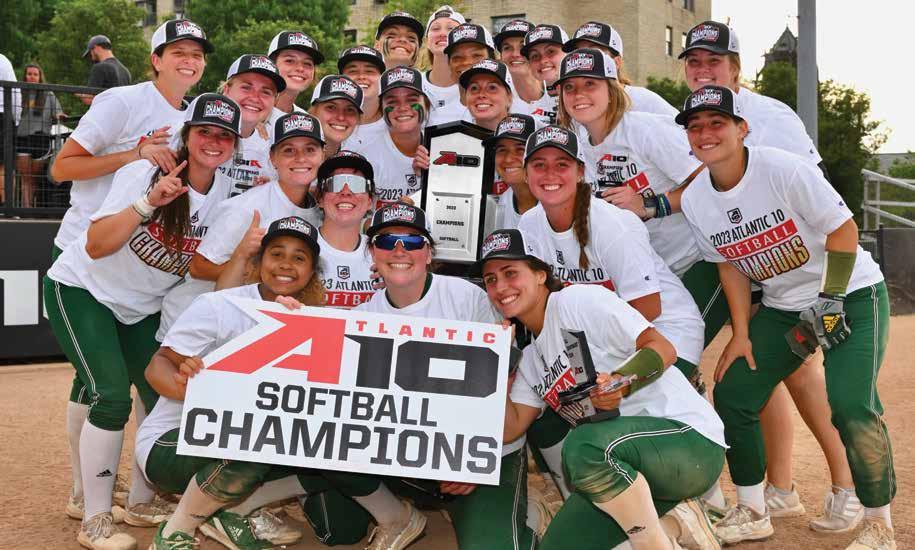
SUMMER
SPIRIT
2023 A MAGAZINE FOR THE GEORGE MASON UNIVERSITY COMMUNITY
Mason is poised to take the next step in our ongoing pursuit of excellence and purpose. We are ready to realize new opportunities, confront new challenges, and reach new heights through Mason Now: Power the Possible, the Campaign for George Mason University.
Read more on page 20.
 Mason alum Sierra Guard, BFA '22, gazes at the night skies through Mason's world-class Ritchey-Chretien telescope at the Observatory on the Fairfax Campus.
Mason alum Sierra Guard, BFA '22, gazes at the night skies through Mason's world-class Ritchey-Chretien telescope at the Observatory on the Fairfax Campus.
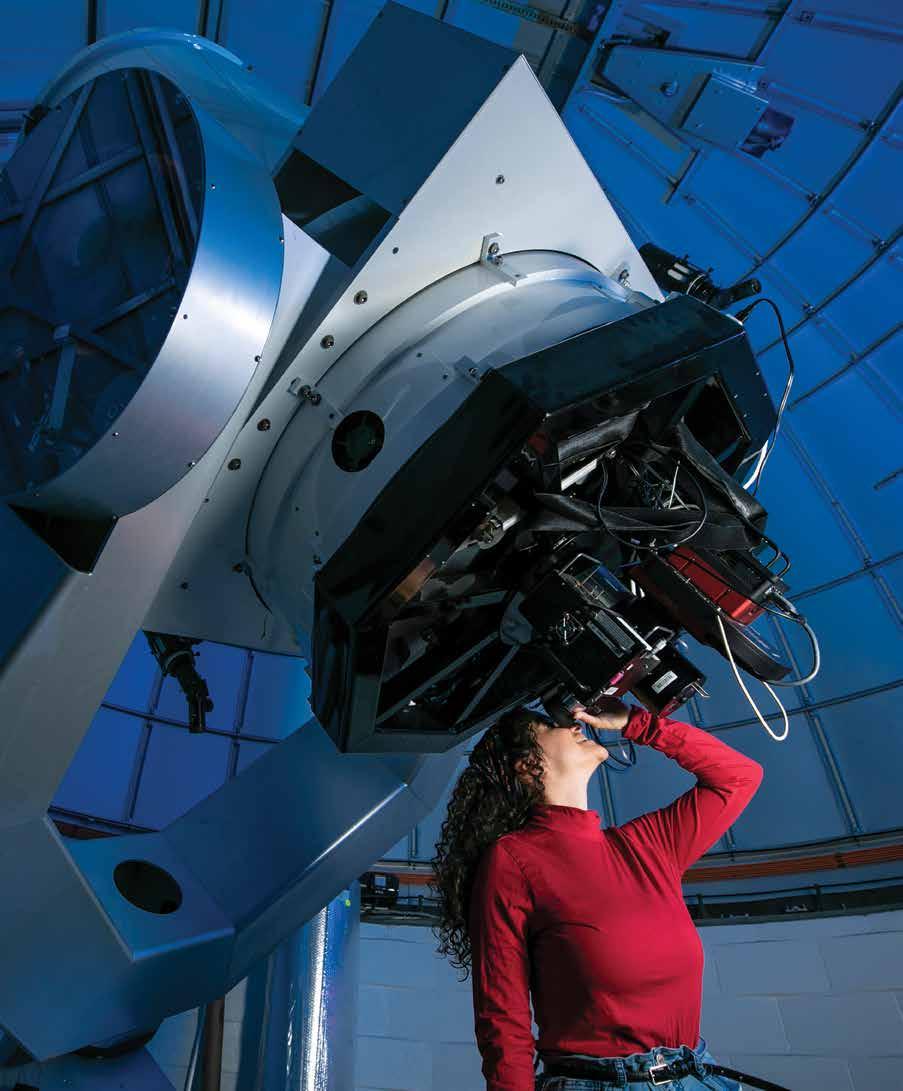
MASON SPIRIT
FROM OUR READERS
READY FOR SOME FOOTBALL
I am giving you some copies of articles from local newspapers on the founding of the Mason club football program 30 years ago. Where are we now 30 years later? I went to three of their games last fall. They made the club football playoffs, but the team gets no publicity. They are the best-kept secret in Northern Virginia. Can the Mason Spirit please give them some coverage?
WE WANT TO HEAR FROM YOU.
Letters to the editor are welcomed.
Send an email to spirit@gmu.edu
Greg Paspatis, BA History ’83
The George Mason University Club Football team was founded in 1992 and currently competes in the 27-team National Club Football Association. Learn more about them at gmuclubfootball.com.
One of the ‘Guys’
At the start of the spring semester, Mason alum Saad Husain , BS Finance ’12, BS Accounting ’12, returned to campus in his role as the director of operations for The Halal Guys to oversee the opening of the chain’s newest location in the Johnson Center. “We are looking forward to being a part of the Mason community,” he says.

A MAGAZINE FOR THE GEORGE MASON UNIVERSITY COMMUNITY spirit.gmu.edu

MANAGING EDITOR
Colleen Kearney Rich, MFA ’95
ART DIRECTOR
Joan Dall’Acqua
ASSOCIATE EDITORS
Melanie Balog
Priyanka Champaneri, BA ’05, MFA ’10
Anne Reynolds
EDITORIAL ASSISTANT
Emma Michels, BA ‘23
CONTRIBUTORS
Kendra Anderson, BA ‘20
Shayla Brown
Martha Bushong
Damian Cristodero
Leah Fogarty
Sarah Holland
John Hollis
Greg Johnson, BA ‘13
Nathan Kahl
Roddena I. Kirksey
Rebecca Kobayashi
Ryley McGinnis
Amanda Milewski
Lauren Clark Reuscher, MA ‘12
Corey Jenkins Schaut, MPA ’07
Jessica A. Smith, BA ‘14
Preston Williams
GRAPHIC DESIGN
Claire Brandt
Jeeun Lee Namgoong
Michaela Reilly, BA ‘21
Azriel Towner, BFA ‘19
PHOTOGRAPHY AND MULTIMEDIA
Ron Aira
Melissa Cannarozzi, MA ‘22
Evan Cantwell, MA ’10
Cristian Torres
PRODUCTION MANAGER
Brian Edlinski
EDITORIAL BOARD
Stephanie Aaronson, BA ‘94
Deputy Vice President for Communications and Mason Media
Paul G. Allvin
Vice President for University Branding and Chief Brand Officer
Trishana E. Bowden
Vice President for Advancement and Alumni Relations
Kathleen Diemer
Associate Vice President for Advancement Relations
Robin Rose Parker
Assistant Vice President for Communications
Check out the QR code for a complete list of upcoming events.
Join us!
Jennifer W. Robinson, JM ‘02
Associate Vice President for Alumni Relations
Mason Spirit is published three times a year by the Office of Advancement and Alumni Relations and the Office of University Branding. George Mason University is an equal opportunity employer that encourages diversity.
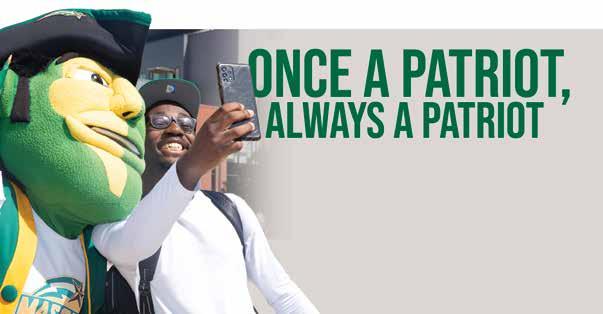 PHOTO BY RON AIRA
PHOTO BY RON AIRA
MASON SPIRIT
TACKLING VIRGINIA’S CHALLENGES
MASON
POWER THE POSSIBLE
Thanks to the efforts of two Virginia representatives and two U.S. Senators, Mason now has federal funding for five separate projects that address some of the state’s most urgent challenges.
BUILDING A LEGACY TO SHARE

We take our role as an institution serving a student body that represents diversity of all kinds seriously, and expanding opportunities for students in financial need is a fundamental part of this mission.
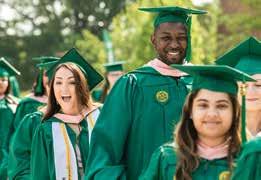
FEATURES
34
20
are raising money to support students, grow our campuses, and take the university to the next level. MORE ON THE WEB When you see this graphic, follow it to the magazine’s website for more: spirit.gmu.edu.
NOW:
We
28
DEPARTMENTS 2 From Our Readers 4 @Mason 40 Inquiring Minds 44 Shelf Life 46 Alumni in Print 47 Patriot Profile 48 Class Notes 50 From the Alumni Association President ALUMNI PROFILES 48 Catherine Read, BA Government and Politics ’84 51 Henry “Hank” Jones, BA English ’07, MA ’10 53 Alaleh Jenkins, BS Accounting ’97 56 Retro Mason
2023 Summer 2023 MASON SPIRIT | 3
SUMMER
@ MASON
Keep updated on what’s going on
STUDENT ENTREPRENEURS HAVE A HOME OF THEIR OWN
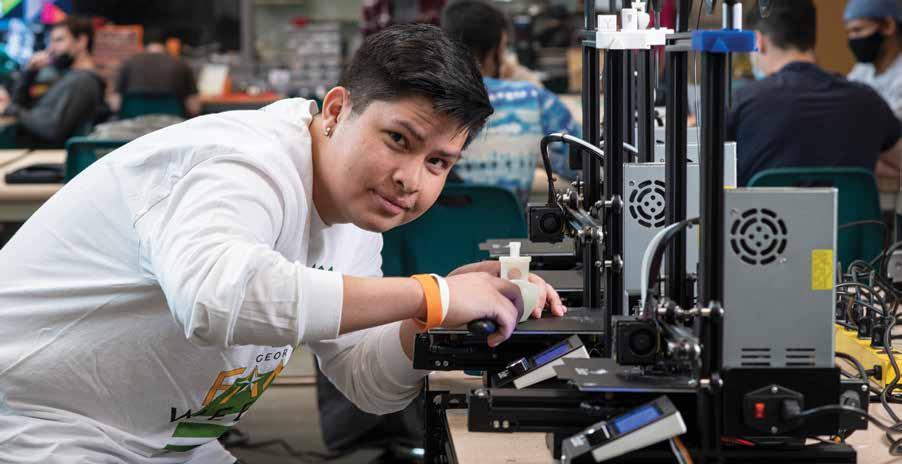
Since the Mason Innovation Exchange (MIX) opened its doors in its new space in September 2021, it has quickly become one of the most popular spots on Mason’s Fairfax Campus.
The MIX, on two floors in Horizon Hall, is home to a makerspace and fabrication lab, a digital media lab, and a startup incubator, offering creative thinkers everything from metal fabrication to business mentoring. Workshops offered throughout the year run the gamut from drone prototyping and creating a podcast to soldering and practicing a business pitch. This comprehensive support for Mason entrepreneurs is offered in a one-stop shop, giving them a distinct advantage over peers at other universities, where such services may be scattered or nonexistent.
Two in-house mentors recently joined the team: Rashed Hasan, founder and CEO of Nantuit and executivein-residence at Mason’s School of Business, and George Siragusa, a senior business counselor at Mason Enterprise Center’s Small Business Development Center (SBDC).
Gisele Stolz, senior director of Entrepreneurship and Innovation Programs at Mason, also serves as a mentor. These mentors meet one-on-one with student entrepreneurs and provide a range of business and entrepreneurship advice.
While the MIX never had any problems attracting students in their old space in the original Fenwick Library, Stolz says the new space allows them to be more deliberate in their planning.
Mason students have access to 3D printers at the MIX.
4 | SPIRIT.GMU.EDU
PHOTO BY EVAN CANTWELL
“This new space was an opportunity to rethink the whole operation,” says Stolz. “We’ve been practicing what we preach and applying lean startup methods to test what works and what doesn’t.”
Among the things that are definitely working is the small business incubator, which has 10 desks, including eight dedicated to student-led businesses. Stolz calls these desks “high-value real estate in the heart of the Fairfax Campus.”
In addition to having a dedicated space in proximity to all the amenities available in the makerspace, teams in the incubator also have access to the mentors and professional development.
Stolz and her team organized a shortened version of the Innovation Commercialization Assistance Program (ICAP), a program offered by the Virginia SBDC to help Virginia-led startups, for student and faculty entrepreneurs. Lessons from the three-week mini ICAP taught by SBDC’s senior business counselor David Powell and ICAP director Josh Green had a remarkable effect on student entrepreneurs.
During the 2022–23 academic year, the MIX had seven student companies in residence. The course taught the students a lot of the nuts and bolts about the business operations of starting a company such as registering the company with the state and tax considerations.
Sai Gutala, BS Electrical Engineering ’22, found the mini ICAP “the most helpful thing ever.”
With his company Alphawave, Gutala is using technology to develop appearance-customizable apparel. For him, the biggest takeaway from the training is what he learned about customer segmentation.
“ICAP focuses on finding your ideal customer who will be loyal to your company,” says Gutala, who also founded a student club called the Inventors and Innovations Team during his time at Mason. “If a business understands their customer, everything else is easy.”
Communication major Arastalis B. Choudhury and computational and data sciences major Fariha Askar, cofounders of NECX, also found the information about customer segmentation critical to building their business.
NECX, which stands for Non-Emergency Communication Exchange, is a multiplatform service that will coordinate and aid communications between victims of crime and the police and other government resources available to them.
“We had a very hard time figuring out who our customer was,” says Choudhury, who came up with the idea for the company after his car was stolen. “We knew how it could help this problem that was out in the world, but we didn’t know who exactly would pay for it. ICAP really helped us with that.”
Choudhury and Askar also found value in being around other student entrepreneurs at the incubator.
“There were a few teams that were a bit ahead of us [in terms of creating a business],” says Askar. “[Hearing their stories] provided a lot of insight because we could learn from their problems and also see problems to come.”
—Colleen Kearney Rich, MFA ’95
Communication major Arastalis B. Choudhury and computational and data sciences major Fariha Askar are the cofounders of NECX, one of the student businesses in the incubator.
LEARN MORE ABOUT EVENTS AND OFFERINGS AT THE MIX. MIX.GMU.EDU
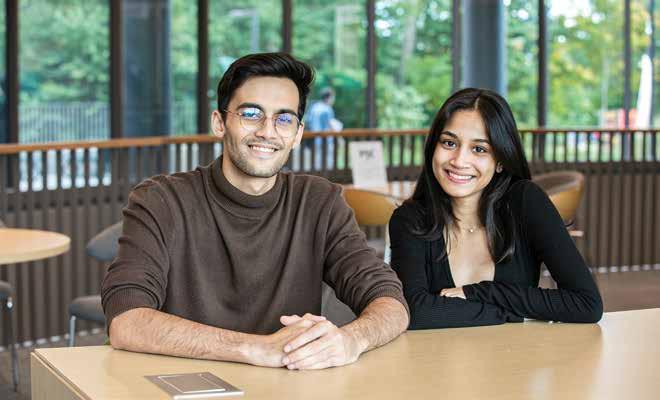
@MASON
Summer 2023 MASON SPIRIT | 5
PHOTO BY CRISTIAN TORRES
CLOSE TO HOME: FOOD INSECURITY ON MASON’S CAMPUSES
Mason Vision Day is an opportunity for our community to come together each year and support an initiative on campus. This year we tackled food insecurity among our students.
Food insecurity is more prevalent than many people realize, particularly among college students.
“A student who is encountering food insecurity experiences a consistent lack of food because of financial conditions,” says Rose Pascarell, MA ‘92, vice president for University Life.
Up to one-third of students nationally are impacted by food insecurity. Pascarell noted particular increases among certain student populations at Mason, including international students.
Vulnerable students may find that balancing academics with financial demands can be challenging. Even if students are aware of resources, the social stigma surrounding food insecurity can prevent many from seeking help. Nationally, 34 percent of students drop out of school because of such issues.
Mason has an important ally in this work: The Capital Area Food Bank (CAFB) has announced that it is partnering with Mason to address campus food insecurity and

will match the funds raised during Mason Vision Day. The CAFB anchors the Washington, D.C., region’s hunger-relief infrastructure, providing more than 50 million meals to communities in the area each year.
Through the Student Support and Advocacy Center (SSAC) within University Life, Mason offers a variety of resources for students experiencing food insecurity, including access to meal swipes, gift cards to purchase perishable foods, and connections to community resources.
One of Mason’s most well-known programs that directly supports students experiencing food insecurity is the Patriot Pantry. Originally known as the Pop-Up Pantry, the resource was created by then-student Yara Mowafy, BA Global Affairs ’14, MA ’15, and University Life staff member Michael Galvin, MAIS ‘08.
“We started bringing our own stuff, toilet paper and things like that,” says Mowafy, who now works for Relief International as a regional program manager. “Everybody found out that we were doing this, and it was no longer a ‘pop-up pantry.’ It was a real, organized thing.” The following year, the renamed Patriot Pantry expanded to provide more supplies and resources to students and relocated to a new space in Student Union Building I.
During the past three years, student use of the Patriot Pantry has increased by 172 percent.
As of the end of April, the Mason Vision Day 2023 food insecurity initiative had raised nearly $90,000, and the event overall—supporting initiatives throughout the university—raised $290,000.
“Food insecurity is a complex problem that we simply can’t address through one solution,” says Pascarell. “Partnership with organizations, like the Capital Area Food Bank, goes a long way toward helping us address food insecurity more holistically on our campuses.”
—Kendra Anderson, BA ‘20, and Anne Reynolds
@MASON
LEARN MORE ABOUT WHAT MASON IS DOING TO STAMP OUT FOOD INSECURITY ON CAMPUS AND HOW YOU CAN HELP.
6 | SPIRIT.GMU.EDU
PHOTO BY SHELBY BURGESS
LUCHINI HONORED WITH OUTSTANDING FACULTY AWARD
Alessandra Luchini, a professor at Mason’s Center for Applied Proteomics and Molecular Medicine (CAPMM), is among the 12 educators formally recognized by the State Council of Higher Education for Virginia (SCHEV) this year with a 2023 Outstanding Faculty Award. Here are some things you should know about her.
■ Luchini is the 28th Mason professor to receive the Outstanding Faculty Award in its 37-year history. The award recognizes faculty at Virginia’s public and private colleges and universities who exemplify the highest standards of teaching, scholarship, and service.
■ In addition to teaching and research, Luchini is the director of the Biosciences PhD Program within the School of Systems Biology in the College of Science. “I really love teaching, and what gives me the biggest satisfaction is witnessing [my students’] growth and working with them to identify and reach their professional and scientific goals.”
■ Originally from Italy, Luchini came to the United States in 2005 on a grant from the Italian National Health Service to study ways to detect molecular signs of cancer. She worked at CAPMM as a research fellow for two years. That same year, she completed her PhD in bioengineering at the University of Padova.
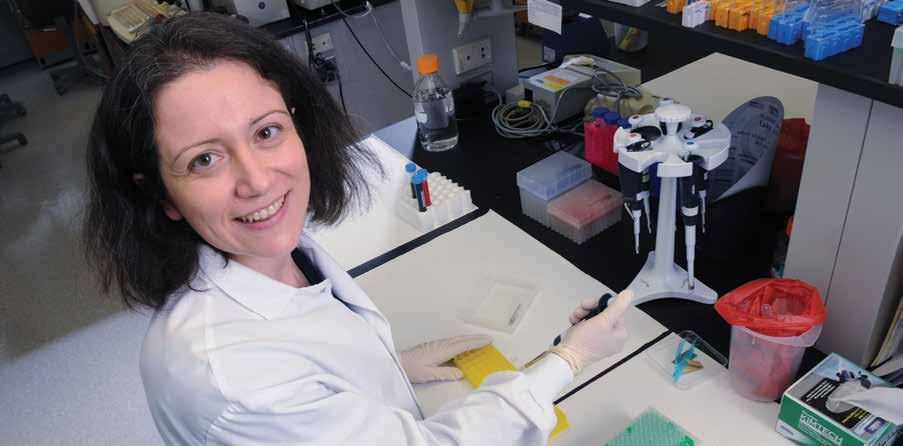
■ In 2011, Popular Science named Luchini one of their Brilliant 10 for her work using nanoparticles to trap and preserve biomarkers to help detect cancer. This remains a focus of her work. Her research interests include developing technologies that improve current diagnostics and therapeutics for diseases. She is currently studying the effect of the microbiome on early breast cancer.
■ She is also part of the fight against Lyme disease and helps lead a team of CAPMM researchers that was named one of ten Phase 1 winners of the LymeX Diagnostic Prize (see story on page 41). “I interact with doctors who recommend patients for our clinical trials. I interact with patients and hear their stories. Hopefully, my research allows them to understand a little bit more about what they have and how they can improve their health. It is a good reminder of why we do what we do—which is to help people.”
■ She is one of the founders of Ceres Nanosciences, a Northern Virginia company created in 2008 that focuses on incorporating the Nanotrap particle technology into diagnostic and research-use products and workflows, and Monet Pharmaceuticals, a pharmaceutical company in Prince William County that exclusively licenses Mason-owned patents.
@MASON Summer 2023 MASON SPIRIT | 7
PHOTO BY EVAN CANTWELL
The first woman to “drive” on Mars was a Mason alum. Ashley Stroupe, MS Electrical Engineering ’98, typically spent one day a week driving the Mars rover Opportunity and the other four days as the lead science planner on the rover Curiosity in her work at NASA’s Jet Propulsion Lab. You can hear Stroupe speak about her experiences in the 2022 documentary Good Night Oppy, which chronicles the work of scientists in the Mars rover program and is now available for streaming on Amazon Prime.
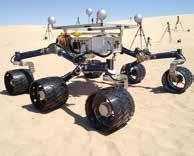
MASON DINING LAUNCHES KOSHER PROGRAM AT SOUTHSIDE

Mason Dining has worked closely with Mason Hillel and Chabad at Mason to provide students, faculty, and staff with an eclectic mix of kosher cuisine at Southside Dining Hall, enabling Jewish students to easily follow kosher dietary rules.
The station, known as Mason Mensch, launched in January and serves kosher dinners Sundays through Thursdays on a first-come, first-served basis.
Rabbi Daniel Novick from Mason Hillel says his team is grateful to their Mason colleagues for years of partnership that helped get them to this point. “We are not only excited about what this means for our Jewish community now, but how this will help our efforts to make Mason an attractive destination for Jewish students for years to come.”
Char Bar, a well-known kosher establishment in downtown Washington, D.C., is providing a selection of brisket tacos, hot honey chicken, burgers, kabobs, sandwiches, and more. Production and service will be overseen by a mashgiach—an expert kosher supervisor—to ensure the highest standards are followed.
This addition to the dining program has been in the works for years and aligns with the university’s overall mission of inclusion. Mason Dining is thrilled to be able to bring the Mason community food that is both delicious and respectful of kosher rules.
“With such a diverse campus and requests for foods that fit into a kosher lifestyle, we are very excited to bring this innovative and inclusive concept to fruition at Mason,” says Pascal Petter, executive director of Mason’s Auxiliary Services.
“There’s a Jewish expression, ‘May we go from strength to strength!’” says Rabbi Ezra Wiemer, codirector of Chabad at Mason. “This is a huge milestone for the Jewish community, and we are thankful to the Mason administration for their true commitment to inclusion.”
—Aliya Rinaldi and Sofya Vetrova , BS ‘19
Bracha and Rabbi Ezra Wiemer of Chabad at Mason with Char Bar owner Michael Chelst at the opening of Mason Mensch.
@MASON
8 | SPIRIT.GMU.EDU
PHOTO BY SOFYA VETROVA
During the 11th annual Mason Lobbies trip to Richmond, Mason students donned green, gold, and their very best to meet with state legislators at the Virginia State Capitol.
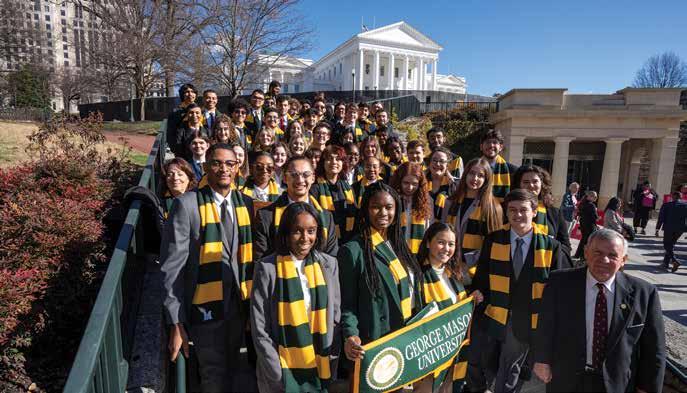
STUDENTS GET FRONT-ROW SEATS TO LEGISLATIVE PROCESS
Forty Mason students traveled to Richmond in January for Mason Lobbies and shared their college experience with legislators. They also highlighted the need for increased financial aid for Mason students, more funding per student, and higher staff and faculty salaries for the university to be more competitive in the Washington, D.C., area.
President Gregory Washington, Vice President for University Life Rose Pascarell, MA Sociology ‘92, and members of Mason’s Community and Government Relations team accompanied the students.
Cyber security engineering major Paul J. Wyche, speaker of Mason’s 43rd Student Senate, helped plan the day. “Our goal was not only to make legislators aware of the lack of funding Mason receives in comparison to similarly sized institutions but also to get them energized and passionate about changing this,” he says.
Students met with Virginia Secretary of Education Aimee Rogstad Guidera and two Mason alumni legislators, Delegate Charniele Herring, BA Economics ’93, and Senator Jeremy S. McPike, BA Public Administration ’97, MPA ’06.
“Get engaged in the political process now,” McPike told the students. “Everything we as legislators do touches your lives. Policy, regulations, and education— it’s all intertwined.”
Michele Adjei-Fah, a senior biology major who plans to attend medical school, says Mason Lobbies is an opportunity for students to use their voices to improve Mason. “It’s important for students to highlight their concerns and ensure Mason receives the support it needs from the state. Being able to address concerns directly to legislators is empowering.”
“Students brought their own anecdotes and experiences, which drove those points home to legislators,” says Lauren Posey, associate director of state government relations at Mason.
Delegate Michelle Maldonado says events like Mason Lobbies are valuable for legislators because they hear diverse perspectives that help them make better decisions. “No one group should be burdened with changing society. It’s all of our responsibility to make society better.” She encourages students to believe in themselves. “You have all that you need to succeed,” she says. “Surround yourself with people who will bring out your skills and talents.”
This was the first in-person Mason Lobbies event since 2019. The joint effort is led by the Office of Student Involvement and the Office of Government and Community Relations.
—Roddena I. Kirksey
PHOTO BY EVAN CANTWELL
@MASON Summer 2023 MASON SPIRIT | 9
NEW SMART GRID LAB PUMPS UP POWER RESEARCH

You’ve seen it in the movies—a massive wall of monitors in a dark room displaying blinking charts and graphs while busy technicians press buttons and shift levers.
The new Smart Grid Lab, opening in 2023 in George Mason University’s Van Metre Hall at Mason Square, will recreate a modest version of this kind of control center and offer hands-on experience to Mason students and professional practitioners. This powerful lab will help position Mason as a leader among Virginia universities in hands-on learning and research in power engineering.
Many power engineering programs have shuttered over the last 20 years, causing an industry workforce shortage. Further, the nation is struggling with an aging power grid infrastructure and an increasing electricity demand. The lab presents a valuable experiential learning opportunity unique to Mason students by enhancing their education in a field in dire need of expertise and people power.
The lab will include three workstations with a real-time digital simulator (RTDS) and a supervisory control and data acquisition (SCADA) system, among other features. These stations can either be linked together to imitate the entire grid or used independently to examine particular subjects.
Mason engineering professor Liling Huang notes that few universities offer this immersive educational experience. “This will be a unique living lab for Mason students. It allows us to reach beyond the 4,000 square feet of the lab,” Huang says. “We can start observing the campus energy flow and collect data. That can support our future research in data analytics, machine learning, digital twins, computing, or cybersecurity of the smart grid and smart cities.”
The lab will enable students and researchers to conduct various hands-on experiments, work with hardware-inthe-loop (HIL) simulations, and analyze simulation data related to power and energy systems. These activities will encompass various aspects of power systems, smart grid technology, microgrid, renewable energy, electric machines, and energy management systems.
Additionally, Huang says that, when using the SCADA system and display wall, students and faculty in the lab will collect consumption data and display energy flow at Mason Square and the Fairfax and Science and Technology Campuses. The lab will also be used for security and resiliency testing, ensuring that power systems are adequately equipped to manage and mitigate potential cyberthreats or disruptions.
Huang says Mason is an ideal place to pursue this type of research and education, particularly with its location in the Washington, D.C., metropolitan area, near the federal government and one of the largest data center markets in the world.
“The new Smart Grid Lab is critical to training and modeling, simulation, and digital twin research. It will support a secure next-generation power grid,” says Liza Wilson Durant, associate provost for strategic initiatives and community engagement at Mason. And, she notes, the lab foreshadows bigger plans to come at Mason Square. “The lab is the precursor to a larger lab capability in Fuse, a net-zero ready facility that will serve as a living laboratory.”
—Nathan Kahl
PHOTO BY RON AIRA
@MASON 10 | SPIRIT.GMU.EDU
THE SMART GRID LAB IS AN EXAMPLE OF THE KIND OF WORK THAT WILL BE TAKING PLACE AT FUSE AT MASON SQUARE, CURRENTLY UNDER CONSTRUCTION.
CONGRESSMAN DON BEYER, MASON STUDENT AND LIFELONG LEARNER
One of Mason’s most popular students is also a nontraditional one: U.S. Congressman Don Beyer. And like many Mason students, the 72-year-old is also juggling work and classes.
So far, TV crews from ABC and CBS and a photographer from the Washington Post have accompanied the former Virginia lieutenant governor to his math classes to capture his education journey.
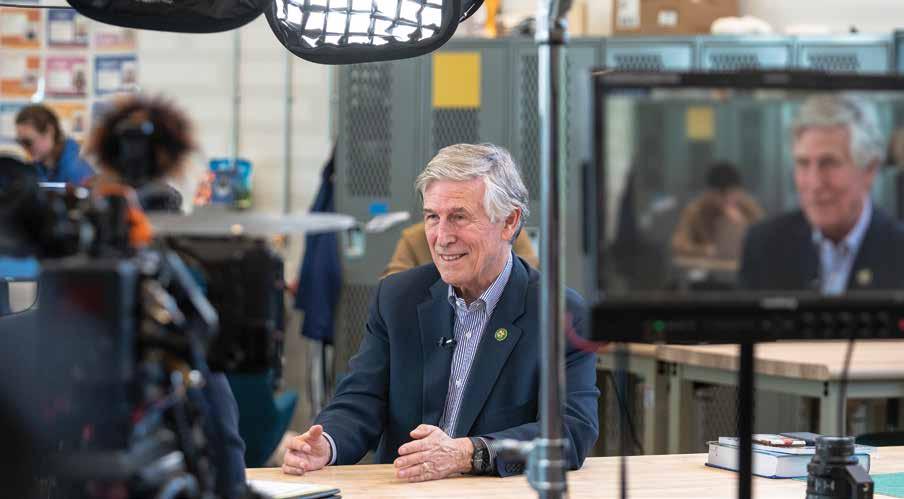
Beyer told the Washington Post that hearing about the work of Mason’s Institute for Digital Innovation and the plans for Fuse during a visit to Mason Square are what spurred his interest in furthering his studies.
“It was so impressive. I said, ‘Can I take courses here?’ ”
Beyer told the Post.
Beyer, whose full-time job involves representing Virginia’s Eighth District and chairing the House science, space, and technology subcommittee, enrolled at Mason
in fall 2022 to begin work toward a master’s degree in computer science with a concentration in machine learning. Right now, he is working to complete several prerequisites in math and computer science before he can start his graduate program.
Beyer feels strongly that before the U.S. Congress can regulate or enact laws regarding technologies, such as artificial intelligence, they need to have a better understanding of the tools and their potential. And like a lot of Mason students, he hopes to one day apply what he is learning in the classroom to his performance at his day job and use his AI knowledge in his legislative work.
The piece ran in March on Good Morning America and ABC News World News Tonight. Watch it here.
Mason student Don Beyer sat down with an ABC News crew at the MIX to talk about artificial intelligence and why he has gone back to school in his 70s.
@MASON
Summer 2023 MASON SPIRIT | 11
PHOTO BY EVAN CANTWELL
Other alumni serving on the city council are Kate G. Doyle Feingold, PhD Criminology, Law and Society ’20, who is serving her first term on the council, and Jeffrey C. Greenfield, BA Political Science ‘89, MPA ‘92, the first Mason alum to sit on the city council, who is serving his 13th term.
CLASS AND CITY COUNCIL ARE IN SESSION FOR THIS SENIOR
While most college seniors are counting the days until graduation, Mason physics major Billy Bates decided to take on a new challenge. In fall 2022, he ran for the City of Fairfax City Council and won. In January, he was sworn in.
This was not an impulsive move for Bates, who says he has been involved in politics and the Young Democrats since he was 14 and attending Fairfax High School. “That’s when I started paying attention to politics, volunteering, and emailing the city council about different issues.”
Bates didn’t waste any time immersing himself in the Virginia political process. He has worked for OneVirginia2021 and interned on the campaigns of U.S. Representative Gerry Connolly and former Virginia governor Terry McAuliffe. He also campaigned for State Delegate Alfonso Lopez and then worked in his district office conducting policy research.
One of his first political supporters was Mason alum Catherine S. Read, BA ‘84, the new mayor of the City of Fairfax (see page 48). “She was one of the first people to urge me to run for city council,” says Bates, who plans to graduate in December. “She really did a lot to help me throughout the campaign.”
“He is smart, he is committed, and he’s about as geeky, wonky, and in the weeds about local government as you can imagine,” says Read of Bates.
Bates’s commitment to the city council involves three or four meetings a month and an occasional weekend retreat. For right now, Bates isn’t thinking about going into politics full time.
“It’s kind of like cake,” he says. “I look forward to it every week, but if I had it all the time, I’d get tired of it.”
Since coming to Mason, Bates has dabbled in several majors, taking courses in government, business, and bioengineering. He decided on physics in part for the challenge of it.

“I decided that I’d get more out of doing a major like engineering or physics, which strengthens a side of my skillset that doesn’t really come as naturally to me.”
Bates’s concentration is in computational physics, and he aspires to do theoretical research and ultimately earn a PhD. Right now, he is taking Physics 402 Introduction to Quantum Mechanics. “That’s honestly my favorite class so far.”
When not doing schoolwork or handling council responsibilities, Bates hits the gym. He finds physical activity is critical for managing stress. He also enjoys hiking with family and friends. One of his favorite trails is in Daniels Run Park in Fairfax. And it’s obvious he is a big fan of Fairfax.
“There are some really beautiful spots,” he says of his hometown. “It has a lot of character, a lot of history. It’s my home.”
—Colleen Kearney Rich, MFA ’95
PHOTO BY RON AIRA
@MASON 12 | SPIRIT.GMU.EDU
MARY “MISSY” CUMMINGS
First American Bank Endowed Chair and Director of the Autonomy and Robotics Center

As one of the U.S. Navy’s first female fighter pilots and an engineer, Mary “Missy” Cummings is accustomed to breaking barriers and solving problems. So, when the opportunity to develop a new interdisciplinary program in artificial intelligence (AI) at George Mason University’s College of Engineering and Computing (CEC) emerged, she didn’t hesitate.
Cummings, who wants to increase the public’s and workforce’s understanding of AI and its limits, calls herself a “tech futurist” whose job is to make tech work. “It’s not to stop tech, it’s to help it get better.”
Understanding the Limits: Before coming to Mason, Cummings served as the senior safety advisor to the National Highway Traffic Safety Administration. She says that experience sparked her interest in the design and deployment of AI. “We have a genuine technical illiteracy problem,” she says. “It’s not that people can’t understand AI. It’s that people are just not being educated in how AI is constructed or in its limitations.”
Asking the Right Questions: Cummings is concerned the United States doesn’t have an effective workforce when it comes to understanding, managing, acquiring,
evaluating, and testing AI. She wants industry and government employees to know how to ask the right questions about performance weaknesses and understand where to invest tax dollars. She wants people to learn about the right way for humans and AI to work together, as well as to learn what is truly attainable and what is merely hype. “Intelligence technologies are advancing so rapidly. What we’re not doing is keeping up with allowing people to get educated in how to think about the design frameworks behind these systems.”
Preparing the Tech Workforce: Cummings is proposing a new degree program in AI that will target engineering students and those in policy, law, and public health. “To navigate the world of AI, students also need softer skills in policy and maybe even ethics,” Cummings says. “I think traditional academia has a hard time accepting new areas, like a degree program in the design and deployment of AI. Older schools with more ingrained traditions struggle to embrace newer thinking. I don’t think Mason is like that. President Gregory Washington, [CEC] Dean Ken Ball, and others at CEC have embraced these ideas.”
BE THE DIFFERENCE
Mason Delivers
All Together Different
#alltogetherdifferent
—Martha Bushong
Summer 2023 MASON SPIRIT | 13
PHOTO BY RON AIRA
MASON NATION MEET THE
DELIAH “DEE” ARRINGTON
Dee Arrington, the site coordinator at Mason’s Potomac Science Center, has one of the best “offices” at the university. Since 2017, she has worked at the 50,000-square-foot LEED Silver-certified research facility located along Belmont Bay in Woodbridge, Virginia.

With a bachelor’s degree in aquaculture, fisheries, and wildlife biology from Clemson University, Arrington applies her expertise daily to support the center, which includes laboratories for teaching and research, lecture rooms, event space, outdoor trails, and more.
Focused on the Environment: The site is home to several Mason research centers, including the Potomac Environmental Research and Education Center, Vessel Dynamics Laboratory, and the Flood Hazards Research Lab. Arrington says the ability to conduct research on the water is essential for these researchers, but don’t forget to keep your eyes wide open. “When you visit, be sure to bring your camera and binoculars. It’s not uncommon to catch an osprey or bald eagle in flight near the center,” she says.
On Golden Ponds: Before coming to Mason, Arrington was the pond manager at a fish hatchery in South Carolina, where she managed the daily operations of more than 20 ponds, led research projects, and helped maintain the facility and its grounds. This expertise helps her convey the important work and mission of the center to visitors.
Part of the Ecosystem: Like many of the newer buildings enhancing any of Mason’s campuses, Potomac Science Center includes intentional
features designed to both protect and heighten awareness of the environment. Large aquariums were recently installed in the exhibit gallery, allowing visitors to get a close look at local fish. In 2021, international graffiti artist TakerOne created the mural Fauna of Belmont Bay, which beautifies the adjacent parking garage and celebrates the local ecosystem. A 250-square-foot exterior wall that faces the bay is covered in plantings. “The facility has many intentional design features to reduce electric costs. Building condensate and rainwater are used to irrigate our living wall,” Arrington says.
On the Ball: Outside work, soccer is one of Arrington’s greatest passions. She played soccer in college as an undergraduate as well as professionally with the Philadelphia Charge, and she has coached at the college and youth levels. “Soccer has been a huge part of my life and has afforded me many opportunities to travel the country and play with the best players in the world,” Arrington says.
Be Our Guest: The waterfront facility’s scenic location also makes it an appealing event destination for many, and Arrington plays a vital role in supporting the daily logistics and operations. Events can include team retreats, small conferences and workshops, and even the occasional wedding. She also leads tours for community members and others. “Every day is different, and that is one of the reasons I enjoy working here,” Arrington says. “Did I mention the beautiful views?”
—Lauren Clark Reuscher, MA ’12
Job: Site Coordinator at the Potomac Science Center
14 | SPIRIT.GMU.EDU
PHOTO BY EVAN CANTWELL
A HAT TRICK FOR MASON ATHLETICS
Mason Athletics has been building its leadership roster this spring with the addition of a new athletic director, a new men’s basketball head coach, and the extension of Mason’s women’s basketball head coach’s contract.
Marvin Lewis is the new assistant vice president and director of Intercollegiate Athletics. The Germantown, Maryland, native boasts 15 years of athletic administrative leadership with various impressive NCAA Division I institutions. Lewis, who begins July 1, assumed senior leadership roles at Georgia Tech, University of Maryland, Georgia State, and most recently at Brown University as the school’s assistant vice president for athletics and recreation/chief operating officer.
Lewis is regarded as one of the nation’s most respected up-and-comers in athletics administration, having been named to the CollegeAD Next Up list in 2017 and the 2018-19 College Athletic Business Management Association (CABMA) Manager of the Year. He successfully completed the prestigious NCAA Pathway Program for aspiring athletics directors and conference commissioners in 2020.


“I am attracted to Mason because of its distinct blend of world-class academics, nationally competitive athletics, and the location in Northern Virginia,” says Lewis. “Mason is everything that is right about higher education, creating diverse and inclusive communities that enhance the experience for all students.”
Tony Skinn, BA Communication ’06, was named the 12th head coach in Mason men’s basketball program history. A key starter on Mason’s celebrated 2006 Final Four team and one of the best all-around guards in program history, Skinn returns to his alma mater after nearly a decade of collegiate coaching.
During that decorated coaching career, he’s guided three different programs, including University of Maryland, to the NCAA Tournament, been a part of six 20+ win campaigns, and established himself as a stout recruiter both within the talent-rich Washington, D.C., Maryland, and Virginia region, as well as across the country.
“It is with great excitement that I return home to Mason,” Skinn says. “I’ve had some of my greatest memories here, and I’m looking forward to making new ones with our fans and our community. Our best days are ahead!”
Women’s basketball head coach Vanessa Blair-Lewis’s contract has been extended through the 2027-28 season. The extension comes after the Patriots’ rapid improvement under Blair-Lewis’s leadership during her first two seasons in Fairfax.

The team saw victories in back-to-back Atlantic 10 Conference tournaments while the number of regular season wins increased by double digits in a short time. Blair-Lewis has seen major success with the women’s basketball team as Mason finished 16-15 this season and 8-8 in Atlantic 10 play, the Patriots’ first winning season since 2017-18. In both seasons since her arrival, BlairLewis has led the Patriots to a win in the conference tournament, including a run to the A-10 quarterfinals this year. In the upcoming 2023-24 season, Mason will return with its top four point-scorers.
“In a short period of time, we have built an amazing family environment and a strong culture in which everyone is loved, valued, and respected,” says Blair-Lewis. “I am proud to serve this great university and will continue to make Mason Nation proud. In all we do, excellence is our standard.”
Left to right, Marvin Lewis, Tony Skinn, and Vanessa Blair-Lewis
@MASON
Summer 2023 MASON SPIRIT | 15
Keep an eye out for the fall 2023 Mason Spirit, which will feature an in-depth look at Mason’s basketball program and an introduction to the new athletic director.
PHOTOS BY RAFAEL SUANES/MASON ATHLETICS
Good vibes: Commencement featured lots of smiles from new Patriot graduates.
MASON CELEBRATES THE CLASS OF 2023
In May, George Mason University graduated its largest class in history, and perhaps its most traveled as well—the nearly 11,000 honorees hail from 111 countries, 50 states, the District of Columbia, Puerto Rico, the U.S. Virgin Islands, and military installations.

At this year’s Spring Commencement, Mason awarded 10,220 degrees and 721 certificates.
Virginia Governor Glenn Youngkin was the featured speaker, continuing a long tradition of the state’s chief executive addressing Mason graduates.
“No matter your faith, your nationality, your race, your culture or creed, as you walk across this stage you will have the opportunity to become a builder of Virginia, a builder of this nation, a builder of the world,” Youngkin told the audience in EagleBank Arena. “The world needs builders. And you will build.”
Galilea Sejas-Machado, graduating with a bachelor’s degree and double major in sociology and criminology, law and society, was the student speaker.
The university presented its highest honor, the Mason Medal, to Northern Virginia technology entrepreneur and philanthropist Kimmy Duong. After being forced to flee her native Vietnam in 1975, Duong arrived in the United States with two suitcases and $30. She created a new life for herself, working at IBM for 25 years. She is now the vice chairwoman and chief financial officer of Pragmatics. Duong and her husband, Long Nguyen, have been longtime Mason supporters. The Long and Kimmy Nguyen Engineering Building on the Fairfax Campus is named in their honor.
The class of 2023 reflects the university’s mission of access, as well as Mason’s leading role in supplying tech talent to the region. About one in four graduates reports that they are first-generation degree earners, and one in three bachelor’s degree recipients are in science, technology, engineering, and mathematics (STEM) fields. Two of the top three master’s programs with the most 2023 graduates are data analytics engineering and computer science, and two of the top five doctorate majors are information technology and computer science.
@MASON
Watch the Commencement recap video.
16 | SPIRIT.GMU.EDU
PHOTO BY EVAN CANTWELL
The new graduates might find encouragement in the success of their predecessors. According to a Mason Career Plans Survey, 87 percent of class of 2022 graduates report a positive career outcome with a median salary of $72,000.

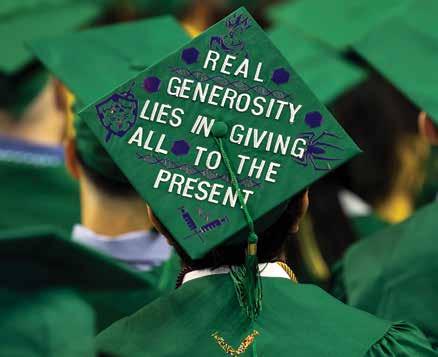
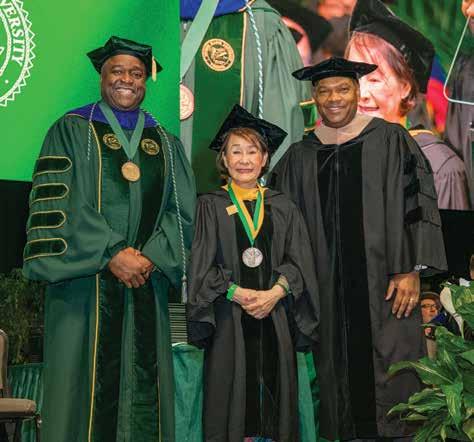
The top five undergraduate majors among the 6,265 undergraduates were business; information technology; psychology; criminology, law and society; and computer science.
For the 3,478 students earning master’s degrees, the top five programs were data analytics engineering, curriculum and instruction, computer science, special education, and business administration.
The top programs for the 337 students earning doctoral degrees were education, psychology, economics, information technology, and computer science.
There were also 140 law school graduates.
—Preston Williams
Left, President Gregory Washington and Rector Horace Blackwell presented Kimmy Duong with the Mason Medal. Right, Governor Glenn Youngkin delivered the Commencement address.
@MASON
PHOTOS BY MAX TAYLOR
@MASON Summer 2023 MASON SPIRIT | 17
PHOTO BY RON AIRA
BEST UNIVERSITIES.
CHECK OUT MASON’S U.S. NEWS RANKINGS
George Mason University is among the top 10 most diverse and innovative public universities in the country, as well as in the top 10 for its undergraduate cybersecurity program, according to U.S. News & World Report’s “2023 Best Colleges List.”
Mason jumped five spots to seventh nationally for diversity and moved up one place to eighth nationally for innovation. Mason remains first in Virginia for both categories. The undergraduate cybersecurity program jumped to 10th nationally among public universities, up from 15th.
In addition, Mason moved up three spots in the overall rankings to 64th among public universities.
President Gregory Washington says the three top 10 rankings and other U.S. News recognition acknowledge that Mason is an institution that equally values both providing opportunities and offering world-class academics and research that drive innovation in the dynamic Washington, D.C., region.
“It’s great to see that the country is recognizing what we already know—George Mason University is continuing its ascent among the nation’s best universities,” says Washington.
The rankings highlight several other Mason programs:
■ Undergraduate computer science climbed five spots to 40th among public universities.
OVERALL RANKING
DIVERSITY
Publics: 7 (up from 12) Best in Virginia
Nationally: 13 (up from 21)
INNOVATION
Publics: 8 (up from 9) Best in Virginia
Nationally: 20
Publics: 64 (up from 67)
Nationally: 137 (up from 148)
BEST FOR VETERANS
Publics: 58 (up from 62)
Nationally: 89
A+ School for B Students
■ Undergraduate business, engineering, and nursing programs also fared particularly well.
Mason has long been known for innovation. Andre Marshall, vice president for research, innovation, and economic impact, says those strengths continue to grow through multidisciplinary research and external partnerships.
Mason’s jump in the U.S. News diversity rankings reflects the university’s increasingly diverse freshman classes and its ability to attract, retain, and graduate students from all backgrounds with no marked disparities in outcomes.
The cybersecurity and computer science rankings emphasize Mason’s leading role in the Tech Talent Investment Program, a statewide initiative to fill critical job vacancies in the Commonwealth of Virginia. In addition to the cybersecurity and computer science rankings, undergraduate engineering was 57th among public universities, another indication that Mason is educating and graduating the digital innovators of the future.
Other Mason undergraduate programs U.S. News rated particularly highly were undergraduate business (53rd among publics) and nursing (70th). The undergraduate nursing category was a ranking that U.S. News added last year.
—Preston Williams
UNDERGRADUATE PROGRAMS
Cybersecurity
Publics: 10 (up from 15)
Nationally: 19 (up from 28)
Computer Science
Publics: 40 (up from 45)
Nationally: 72 (up from 82)
Business Publics: 53
Nationally: 86
Engineering
Publics: 57
Nationally: 94
Nursing
Publics: 70 (up from 71)
Nationally: 93 (up from 96)
@MASON 18 | SPIRIT.GMU.EDU
GEORGE MASON UNIVERSITY IS CONTINUING ITS ASCENT AMONG THE NATION’S
PATRIOTS WIN ATLANTIC 10 BASEBALL CHAMPIONSHIP
The Mason baseball team claimed the 2023 Atlantic 10 Baseball Championship with a 6-2 victory of fourthseeded Saint Louis on Saturday, May 27, at The Diamond in Richmond, Virginia. This is the Patriots’s second A-10 title. Mason won its first A-10 title in 2014, the program’s first season in the conference.
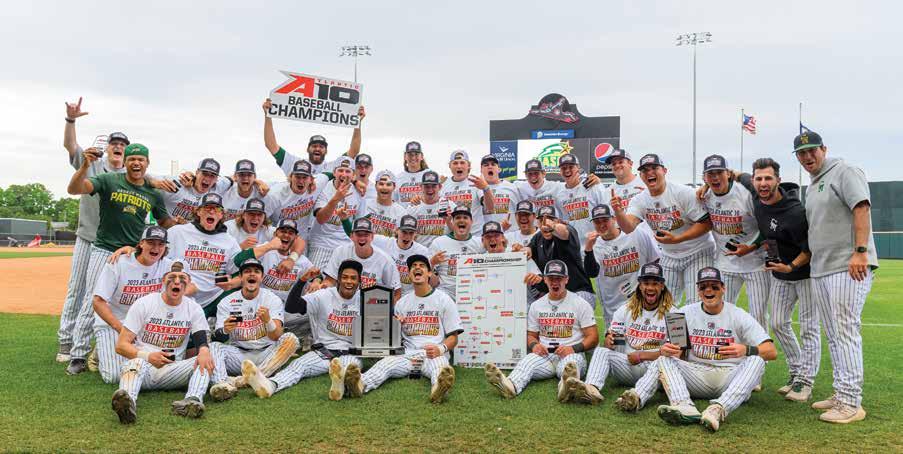
Mason is making its eighth NCAA Tournament appearance. At press time, the Patriots were headed to the
Winston-Salem Regional of the 2023 NCAA Baseball Tournament in Winston-Salem, North Carolina.
This season the Patriots won 34 games under first-year head coach and Mason alum Shawn Camp, BA Sociology ’21, the most the team has posted since 2014. Camp played baseball for Mason from 1995 to 1997.
Find out how they did at gomason.com.
Kinesiology major Milan Pierre-Jerome, team captain of Mason’s women’s soccer team, will represent her native Haiti at the 2023 FIFA Women’s World Cup this summer.
Pierre-Jerome, who is from Fort Lauderdale, Florida, has formally represented Haiti since she was 14 and played at the 2018 FIFA U-20 Women’s World Cup in France.
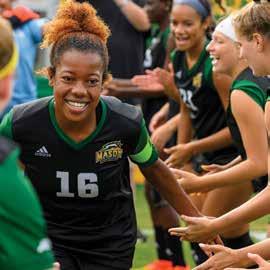
@MASON
PHOTO BY RAFAEL SUANES
Summer 2023 MASON SPIRIT | 19
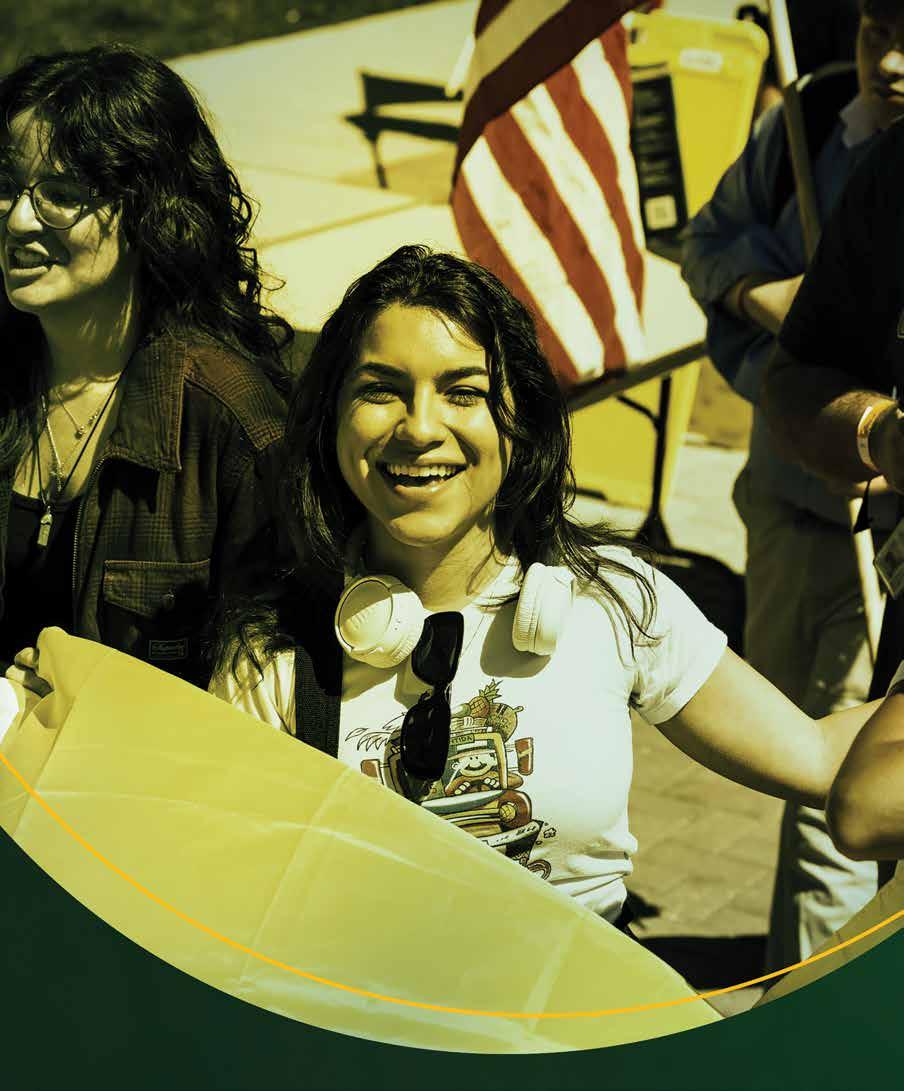
20 | SPIRIT.GMU.EDU
On April 20, 2023, President Gregory Washington announced the launch of Mason Now: Power the Possible, a one billion dollar comprehensive campaign for George Mason University. In his remarks, he laid the foundation for the work ahead. As critical players in the Mason story, we share with you President Washington’s vision for the future—in his own words—explaining why it is Mason’s time to power the possible.

IT’S MASON’S TIME
There is a long precedent in our state for institutions of higher education rising to address the needs of a country at specific times. It began with William & Mary, whose many firsts mirrored the development of a new nation. The University of Virginia then emerged early in the 1800s with a focus on creating a broader educated populace. The establishment of land-grant universities under Abraham Lincoln—focused on agriculture, science, and engineering to meet the needs of the increasingly industrialized nation— gave birth to Virginia Tech.
A little more than 50 years ago, a group of visionary leaders saw that it was time for a new kind of university, one that could meet the needs of a region that was on the verge of unprecedented growth and boundless possibility. Nicknamed “the 123 Club,” they recognized that what Northern Virginia needed was
Summer 2023 MASON SPIRIT | 21
a first-rate university—one that could educate the workforce that would fuel business growth, enrich the community, increase access to opportunity, and drive innovation.
That is how—often against considerable odds— a branch campus became a commuter school, a commuter school grew into a residential campus, a residential campus added professional schools and an Institute of Science and Technology, and a young university became a Tier 1 research institution. All of this was possible because our founders had more than vision—they had an enduring commitment to turn that vision into reality. They were lifelong supporters— as donors, board members, advocates, and advisors. And we’ve had great leadership over the last 20 years with Presidents Johnson, Merten, and Cabrera.
Because of them and the generations of Mason alumni who have laid the foundation, we can state with confidence what is increasingly apparent to the region, the commonwealth, and the nation. Now, it is Mason’s time.
WHY MASON NOW?
Why Mason now? Because Mason is the engine that drives the most populous region in the state. Mason is at the nexus of government and industry, policy and health care, business and technology, culture and innovation.
Why Mason now? Because Mason is an integral partner in why Northern Virginia is home to more than 100 U.S. and global corporate headquarters.
Why Mason now? Because we produce graduates for the 21st century, much as our sister institutions met the needs of previous times. And in true Mason fashion, we
defy definitions and exceed expectations. We are a new kind of flagship institution—focused on creating an informed diverse populace for a democracy that is in peril—and a new kind of land-grant institution, one that prepares all of our citizens to be leaders in science, technology, engineering, and mathematics (STEM) fields, business, the arts, health care, politics, and more.
Why Mason now? Because we reflect the diversity of what our country is today and what it will be tomorrow. Beyond race and ethnicity, our inclusivity extends to diversity of thought, experience, and belief systems. Black, white, rich, poor, gay, straight, right, left, American, international, progressive, conservative—and every shade in between. Whoever you are, you can find yourself here, at Mason.
Why Mason now? Because we know that difference makes us stronger. At a time when our society is increasingly divided, all too often seeing things as binary and in opposition, Mason is proof positive that the free exchange of ideas is a defining characteristic of a free society.
And that was there from the beginning. It’s part of our DNA: As one of the original 123 Club members put it, “We had Republicans and Democrats. While we had different political beliefs, we decided not to figure out who is right, but what is right.”
I am proud to be part of an institution that is home to the Antonin Scalia Law School and the Jimmy and Rosalynn Carter School for Peace and Conflict Resolution. I would have loved to have been able to invite them both to campus for a dialogue. And you know what? I think they would have accepted, because they understood that holding an opposing viewpoint doesn’t make someone “evil,” and that open forums
“ Why Mason now? Because we reflect the diversity of what our country is today and what it will be tomorrow.
22 | SPIRIT.GMU.EDU
are much more productive than echo chambers. And you know it would have been a pretty lively and entertaining evening.
Why Mason now? Because new challenges require new ways of thinking and new folks at the table. Those with the willingness to break the mold and question the status quo. People who believe that a university can accept 90 percent of its undergraduate applicants and also be a Tier 1 research institution. And who refuse to accept that a student’s zip code should determine their educational prospects.
The world doesn’t need to wait for that way of thinking, for those people, or for that university. Because it already exists right here, right now.
THE FUTURE WE CAN CREATE
To fully realize the future we can create, we need more than our talent, our grit, and our audacity. To take this next step, we need a level of financial support that we richly deserve but have yet to receive. That is why we are launching Mason Now: Power the Possible, the Campaign for George Mason University, with the goal of raising one billion dollars.
Let me share a few examples of how this campaign will help Mason lead Virginia into the future.
We will dramatically increase scholarships and support services for our students.
We will also name five of our current schools and colleges to add to the Carter, Dewberry, Scalia, Schar,
and Volgenau schools. And because we are Mason, we are already off and running: a $50 million planned gift to the George Mason University Foundation has established the Donald G. Costello School of Business.

We will build upon the Mason Virginia Promise— one of the first initiatives I launched as president. If you are a Virginian, we will provide a pathway for you to earn a four-year degree at Mason. Or, if you want to start your own business, one of our more than 27 Small Business Development Centers around the state will support you. This program exemplifies why this is Mason’s time: it empowers individuals; it rewards entrepreneurship; it powers the economy; and it uplifts communities.
We will strengthen our position as a cultural beacon for Northern Virginia with the reimagination of the Center for the Arts. With increased accessibility, amenities, and technical capabilities, the reimagined center will enhance our ability to educate and entertain for generations to come. The arts invite all to our campuses to share experiences, engage in debate, and enrich perspectives. That is the essence of community-building.
We will strengthen our campuses as true hubs of partnership and innovation, underscoring our symbiotic relationship with the communities in which we are located. A prime example is the transformation of the Arlington Campus into what is now called Mason Square, an urban destination of learning, collaboration, and economic development.
Students test soil samples at the Ahn Wetland Mesocosm Compound on the Fairfax Campus.
Summer 2023 MASON SPIRIT | 23
PHOTO BY EVAN CANTWELL
As the largest producer of computing graduates in Virginia, we will forge a new model for what is possible when a university brings scholars, students, and industry together to drive innovation and bring ideas to market. Fuse at Mason Square (pictured left), a technology-forward building that broke ground last year, is the largest public-private partnership in the state’s history, and it will be Virginia’s first LEEDplatinum facility, underscoring our commitment to a sustainable future.

We will continue to expand our commitment to the life sciences, building on last year’s opening of the commonwealth’s first and only College of Public Health. We will meet the critical needs of our region by building a strong talent pipeline based on an inclusive approach to education, research, and practice. I believe this work can lead to Northern Virginia’s first collegiate medical school. Did you notice how I snuck that in? That’s the Mason in me, going right from launching a School of Public Health to envisioning a Mason School of Medicine.
That is just a glimpse of what this campaign will make possible.
MASON’S NEXT 50 YEARS
As we look to Mason’s next 50 years, let us remind ourselves that Mason began as a noble experiment, a “what if.” What if a major university could be formed in the second half of the 20th century—far removed from the established power of the state government—to serve the needs of a growing and diverse population? A new kind of land-grant university, one born and willed out of the community. With the core support of a handful of business leaders who saw what this dream could become, the Mason experiment was launched. And because of the audacity of our students, faculty, staff, alumni, and community, it is an experiment that continues to this day.
And knowing the Mason character, I believe it is an experiment that will never end. Because we will never stop questioning, we will never stop exploring, we will never stop discovering.
“
To fully realize the future we can create, we need more than our talent, our grit, and our audacity.
/ EYP 24 | SPIRIT.GMU.EDU
Our power is proven. Our possibilities are endless. Our time is now.
CONCEPT RENDERING BY MASON INNOVATION PARTNERS
Vice President for University Advancement and Alumni Relations; President, George Mason University Foundation
MASON NOW: POWER THE POSSIBLE
The Campaign for George Mason University will have six guiding themes.

POWER STUDENT SUCCESS
At Mason, every student has the opportunity to ask: “Where do I want to go?” Through Mason Now, we will expand support to ensure that each student has the resources they need to make that journey.
POWER RESEARCH
Faculty and student researchers who embrace risk and welcome diverse perspectives to foster the most effective results will have additional resources through the campaign.
POWER INNOVATION
Mason will invest in meeting future challenges and opportunities by welcoming all voices, questioning the status quo, and fearlessly forging new paths.
POWER COMMUNITY
Just as our learning has no boundaries, the Mason community will grow even further— beyond our local and international campuses, and our community, industry and government partners—to wherever our curiosity takes us.
POWER A SUSTAINABLE FUTURE
Making Mason a leader in responsible stewardship— financially, socially, and environmentally—with a bold vision matched by our sense of accountability to our students, our funders, our communities, and our planet.
POWER WHAT’S NEXT
We know that trust is gained, not a given, and that our outcomes are the best testament of our effectiveness. The campaign will ensure that Mason’s next 50 years are even more impactful than its first.
To learn more about the campaign, visit gmu.edu/masonnow.
“
At Mason, it’s about more than raising funds. It’s about raising expectations. It’s about realizing dreams.
Trishana E. Bowden
Summer 2023 MASON SPIRIT | 25
The largest school naming gift in the university’s history will support Mason’s growing entrepreneurship and innovation programs.
A$50 million planned gift will name George Mason University’s School of Business in honor of Donald G. Costello. This is the largest school naming gift in our 51-year history and was announced as part of the launch of Mason’s one billion dollar comprehensive campaign: Mason Now.
“It is fitting that we announce this transformational gift at the launch of the Mason Now campaign,” says Mason President Gregory Washington. “As the most innovative university in Virginia, Mason leads the way in creating new academic programs to meet the evolving needs of the 21st-century economy. Mr. Costello’s success is a testament to his hard work, tenacity, and steadfastness— the same qualities we seek to instill in our students.”
In addition to establishing the Donald G. Costello School of Business, the gift creates an endowment that will provide scholarships to undergraduate and graduate business students to help prepare them for successful careers as entrepreneurs.
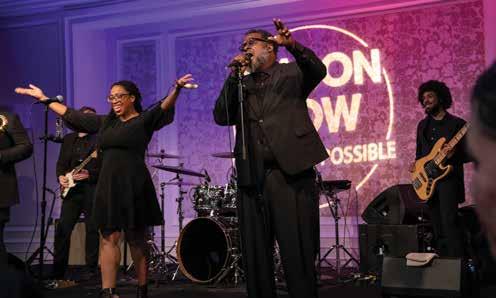
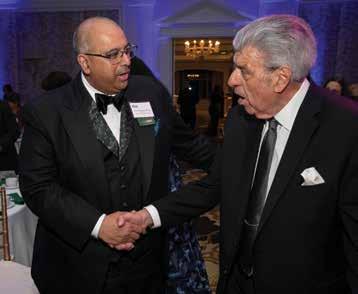
“This gift is a game-changer for the business school and the region,” says School of Business dean Ajay Vinzé. “We are deeply grateful to Joseph Contrucci, trustee of the Donald G. Costello Trust, and Mr. Costello’s daughter, Sara Costello, for their confidence in our ability to extend the legacy of a forward-thinking entrepreneur whose creativity, hard work, and determination changed the lives of people around him.”
Donald G. Costello was born on May 31, 1942, in Leesburg, Virginia. He graduated from Loudoun County High School in 1960 and trained as a forward observer in the U.S. Army. In 1976, he and a partner founded Century Stair Company, which grew to become the largest stair manufacturer on the East Coast. He died on July 21, 2017.
“Don and I have always seen George Mason University and its School of Business as a catalyst in fueling the Northern Virginia economy,” says Contrucci. “This gift will further that impact by creating career opportunities and new businesses for decades to come.”
Former Alumni Association President Sumeet Shrivastava, MBA ‘94, and Joe Contrucci.
26 | SPIRIT.GMU.EDU
The musical group Secret Society performed.
Entrepreneurship and innovation at Mason are at the center of the School of Business strategic plan. The school’s Center for Innovation and Entrepreneurship works with area entrepreneurs, city and civic leaders, businesses, and other colleges and universities to explore business partnerships and entrepreneurial training opportunities to benefit underserved youth.
The School of Business was founded in 1977 and currently enrolls more than 4,600 undergraduate and 650 graduate students, making it the second largest business school among public universities in Virginia.
With a growing physical presence that includes three campuses in Northern Virginia, Mason continues to drive economic growth in a region that extends beyond its host counties of Arlington, Fairfax, and Prince William to the Washington, D.C., metropolitan area and the Commonwealth of Virginia. The Mason Now campaign will support that growth and enhance the university’s ongoing commitment to educational access, innovative research, and impactful community engagement.

MR. COSTELLO’S SUCCESS IS A TESTAMENT TO HIS HARD WORK, TENACITY, AND STEADFASTNESS—THE SAME QUALITIES WE SEEK TO INSTILL IN OUR STUDENTS.
—Gregory Washington
Summer 2023 MASON SPIRIT | 27
From left, George Mason University Foundation president Trishana E. Bowden; Mason Board of Visitors rector Horace Blackman, BA ’93; School of Business dean Ajay Vinzé; Mason President Gregory Washington; Joe Contrucci, trustee of the Donald G. Costello Trust; Sarah Costello, daughter of Donald G. Costello; Peg Contrucci; and Mason Board of Visitors member Jimmy Hazel, JD ’84.
PHOTOS BY RISDON PHOTOGRAPHY
TACKLING VIRGINIA’S CHALLENGES
George Mason University has long been adept at transforming scarce resources into measurable results, and that grit and perseverance are now being rewarded. Thanks to the efforts of two Virginia representatives and two U.S. senators, Mason now has funding for five separate projects that address some of the state’s most urgent challenges.
U.S. Representative Gerry Connolly (D-VA) secured funding for projects focusing on cybersecurity and on mental health, while U.S. Representative Jennifer Wexton (D-VA) championed funding for projects that take on the opioid epidemic and tick-borne illnesses.
U.S. Senators Mark R. Warner (D-VA) and Tim Kaine (D-VA) won funding for a unique tutor-to-teaching program that also combats pandemic-related declines in K–12 learning achievement. All of the funding comes as part of the federal omnibus appropriations bill that President Biden recently signed into law to fund the government through fiscal year 2023.
Such funding doesn’t just provide a financial boost. It’s recognition of the university’s reputation as a bold innovator, and a vote of confidence in our ability to push further with research and technologies that can have far-reaching benefits.
Connolly agrees, saying “George Mason University is a pillar of our community, but the effects of its world-class education and world-changing research can be felt throughout the country.”
Read on to find out more about the projects being funded and their anticipated impact on Virginia.
28 | SPIRIT.GMU.EDU
FEDERAL FUNDING FOR FIVE MASON PROJECTS PROMISES TO EXTEND FAR-REACHING BENEFITS TO THE COMMONWEALTH AND BEYOND
47% OF AMERICAN ADULTS HAVE HAD THEIR PERSONAL INFORMATION EXPOSED ONLINE
BY CYBER CRIMINALS
SECURING THE NATION’S DATA
As technology quickly changes, the U.S. government similarly must adapt its systems and policies to ensure that the nation’s data and technology remain secure— and they will soon have a valuable partner in Mason.

Mason is a leader in cybersecurity, with a program that is currently ranked No. 9 in the world, and a bachelor’s degree in cyber security engineering that was the first of its kind to be offered in the United States. That pioneering expertise will be put to use via the new Mason Center for Excellence in Government Cybersecurity Risk Management and Resilience, which will be supported by $1 million in federal funding secured by Connolly.
The center will act as a strategic partner in cybersecurity and IT modernization efforts through education and workshops for federal government IT and cybersecurity executives and middle managers. In developing and offering these resources, the center will also leverage Mason’s Institute for Digital Innovation (IDIA), to be
housed within the new Fuse building at Mason Square, by leaning on IDIA’s deep interdisciplinary expertise across all facets of cybersecurity research, governance, policy, and education.
Amarda Shehu, associate vice president of research at IDIA and professor of computer science, will operate the center along with J. P. Auffret, director of research partnerships and grants initiatives in Mason’s School of Business and director of the Center for Assurance Research and Engineering.
With a 25-year history in government IT leadership and governance education, Mason is uniquely qualified to lead this effort. Connolly expressed optimism about the center, saying, “I can’t wait to see the results in action.”
Summer 2023 MASON SPIRIT | 29
50.6% INCREASE IN EMERGENCY DEPARTMENT VISITS DURING THE PANDEMIC FOR YOUTH SUICIDE RISK
ADDRESSING MENTAL HEALTH CARE NEEDS
Of the pandemic’s many lasting effects on society, declining mental health and well-being are among the most critical, and youth are particularly susceptible. Federal statistics show that more than a third of young people in the United States have reported persistent feelings of sadness and hopelessness, and suicide is the second-leading cause of death for those ages 10 to 24. In Virginia alone, 86 children died by suicide in 2020.
Thanks to nearly $1 million in federal funding won by Connolly, Mason will continue its existing efforts in addressing this mental health crisis through the Saving Lives and Decreasing Health Disparities project. The project aims to train community clinicians to serve diverse, low-income youth and families and provide access to low- to no-cost, culturally sensitive evidence-based
assessments that can be easily implemented in community mental health settings.
The project leads—Mason psychology professor

Christianne Esposito-Smythers and Psychology
Department chair Keith Renshaw—hope to make a significant impact within the region. “This work is intended to increase the effectiveness of mental health services, reduce the likelihood of life-threatening behavior, and decrease the costs of care for our lowest-income youth and families,” Esposito-Smythers says.
30 | SPIRIT.GMU.EDU
80% INCREASE IN FATAL OPIOID OVERDOSES IN VIRGINIA BETWEEN 2019 AND 2021
COLLABORATING TO COUNTER A CRISIS
Already a crisis before the pandemic, the opioid epidemic has steadily worsened nationwide, with federal, state, and local officials reporting alarming spikes in drug overdoses.

According to the most recent data from the Virginia Department of Health, fatal overdoses in the state from all substances increased by 69 percent between 2019 and 2021; fatal opioid overdoses increased by 80 percent. Nearly three quarters of all Virginia’s drug overdose deaths in 2020 involved fentanyl, an opioid that is more than 50 times more potent than heroin.
Continued isolation from the global pandemic, economic devastation, and disruptions to the drug trade have all fueled the surge. Large numbers of opioid overdose deaths have disproportionately been among those of less privileged socioeconomic status living in rural areas. State statistics also show that people who were incarcerated and have substance abuse disorder
are up to 129 times more susceptible to overdose in the first two weeks following their release.
Mason’s College of Public Health is well positioned to tackle these issues with their expertise in directly supporting health in surrounding communities. Now, with the help of federal funding won by Wexton, researchers at Mason will work to alleviate the substance abuse crisis via the future Empowered Communities Partnership Center.
With the one-time federal investment of $1,037,519, the center aims to coordinate care across systems of support and gather data to develop new models of community care to both prevent opioid overdoses and limit the burden to the state health care system.
Looping in existing Virginia statewide and local criminal justice and public health partners in a collaborative network will be key to the center’s work. There are additionally plans to expand the coordination of care for those with opioid use disorder reentering the community following their release from incarceration.
Mason nursing professor Rebecca Sutter, MSN ’01, DNP ’12, codirector of the Mason and Partners (MAP) Clinics and the Empowered Communities Program, will oversee the center. She emphasizes that Mason’s existing programs and community partnerships are foundational to the center.
“We are building upon our programs to expand our impact,” Sutter says. “This is a partnership center with the local community guiding its work while acting as a learning laboratory for the next generation of public health strategists and leaders.”
Summer 2023 MASON SPIRIT | 31
600 ESTIMATED SAMPLES TESTED FOR TICK-BORNE ILLNESS EACH MONTH AT 5 VIRGINIA CLINICS

TAKING ON TICKS
Like many parts of the United States, Virginia is experiencing an increase in tick-borne illnesses, with particularly high numbers of confirmed cases in Fauquier, Loudoun, Prince William, and Rappahannock counties. Left untreated, tick-borne infections can lead to chronic suffering, disability, and even death. Early diagnosis ensures patients receive appropriate treatment, but there is currently a shortage of adequate and accessible testing throughout Virginia.
Mason’s Center for Advanced Testing: Tick-Borne Disease Diagnostic Clinic will soon help change that. The center will use the one-year federal investment of $820,000 secured by Wexton to deploy diagnostic testing— utilizing a suite of unmatched Mason-developed technologies—that will allow for a quicker and more efficient diagnosis.
“Our unique medical technology to diagnose tick-borne diseases began many years ago,” says University Professor Lance Liotta, codirector and medical director of Mason’s Center for Applied Proteomics and Molecular Medicine. “Our team is thrilled to expand our clinical trial under this special funding to now offer routine testing for the entire commonwealth.”
Mason’s technology for patient sample self-collection does not require refrigeration, and results are communicated to the requesting physician within 24 hours to enable appropriate therapy to begin immediately. This is a stark improvement from conventional technologies, which typically take 6 to 12 days to process at major diagnostic laboratories. Additionally, only one patient sample is needed to detect signatures derived from all the major known tick-borne pathogens.
“Mason scientists have been leaders in helping to prevent long-term illness and disability from these diseases, which are becoming more common in Virginia and across the country,” Wexton says. “I’m grateful to Mason for their work on this issue.”
Given that Mason officials anticipate seeing 600 samples per month at five clinics, the program promises to have a dramatic impact on the region. It’s an impact that is indicative of Mason’s culture of tackling problems in original ways that create measurable results.
32 | SPIRIT.GMU.EDU
ONE PROJECT, TWO GOALS
Nationwide, one of the pandemic’s most dire effects has been the sharp decline in learning achievement for K–12 students. Additionally, the number of teachers leaving the profession has sharply risen, with about 40 to 50 percent leaving within the first five years of their careers.

Mason’s Tutors to Teachers program focuses on tackling both problems simultaneously. The program trains student tutors to address the most pressing gaps K–12 children currently face while nurturing those tutors for careers as future teachers. Now, through federal funding secured by Warner and Kaine, the program will have the support to extend its efforts to even more students and future teachers throughout the state.
Currently, Mason and Virginia Community College System students work with in-service teachers and receive training to provide online tutoring services to low-income K–12 children who are showing pandemic-driven learning gaps. The $1.95 million
in federal funding will be used to prepare tutors to help K–12 students become self-regulated learners. Additionally, through relevant course work, mentoring experiences, and guidance provided by Mason faculty, student tutors will be empowered to enter the teacher workforce prepared with the skills needed to make a positive impact.
The funding enables Mason to build off an existing partnership with Fairfax, Arlington, and Alexandria school districts and extend its reach to public schools in Prince William County, Franklin City, Frederick County, and Spotsylvania County. Plans for expansion include partnering with Historically Black Colleges and Universities, Native American tribes, and other school districts in Virginia.
Mason’s TEACHERtrack Office administers the program, developed by Mason professors Anastasia Kitsantas and Roberto Pamas, both faculty with the School of Education.
40% OF NEW TEACHERS LEAVE THE PROFESSION IN THE FIRST FIVE YEARS
Summer 2023 MASON SPIRIT | 33
Priyanka Champaneri, BA ’05, MFA ’10, and John Hollis contributed to this story.
LEGACY SHARE BUILDING A TO
AtGeorge Mason University, we believe that while talent and passion are distributed equally, opportunity is not. So we look for the talent other institutions miss, and proudly welcome those who are prepared to take on the rigor of pursuing a degree at Virginia’s largest public research university.
We take our role as an institution serving a student body that represents diversity of all kinds seriously, and expanding opportunities for students in financial need is a fundamental part of this mission. Many of our students are the first in their families to pursue a college degree, and they need our support in many ways to be successful.
BY ANNE REYNOLDS
In fiscal year 2022, the George Mason University Foundation was able to offer 1,300 scholarships to students, all made possible by gifts from alumni and friends of Mason.
Scholarship recipient Betzy Balladares Oviedo, a junior majoring in social work, says she’s grateful “not just for

Mason Patriots share how confidence, inspiration for excellence, and validation have all been lasting effects of the scholarship support they received.
34 | SPIRIT.GMU.EDU
PHOTO BY RON AIRA
financial assistance, but inspiration for excellence… I will do everything in my power to make [the scholarship] count.”
Guiding students like Balladares Oviedo toward success is our top priority at Mason. However, the university relies on the generosity of donors such as the Kimmy Duong Foundation, which funded Balladares Oviedo’s scholarship, to ensure students have the necessary resources (See more on Kimmy Duong on page 16).
As the university moves into its ambitious fundraising campaign, the support of our donors continues to be crucial.
For Trishana E. Bowden, president of the George Mason University Foundation and Mason’s vice president for
advancement and alumni relations, that inspiration for excellence that Balladares Oviedo speaks of is a powerful catalyst that can propel a student to make the most of their opportunities.
“The proof of your impact is right here in front of you,” she says. “Any time you have a chance to meet George Mason University students in person, to get to know them a little bit and hear their stories, you realize just how great an investment you are making when you donate to scholarships. It’s a wonderful feeling to know that your generosity is truly making a difference in their lives.”
Read on to meet some of those Mason students and graduates and hear their stories.
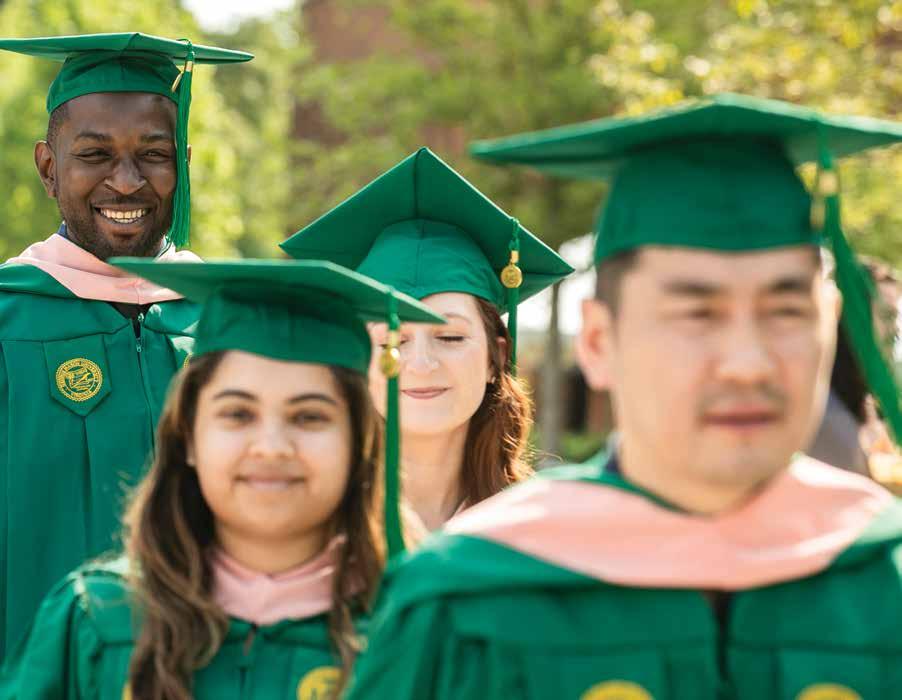
Summer 2023 MASON SPIRIT | 35
BIANCA AKINS
COMPUTER SCIENCE, KELSIE R. TROUTMAN ENDOWED SCHOLARSHIP RECIPIENT
College didn’t always look like a possibility for computer science major Bianca Akins. Akins’s mother passed away when she was 11, and family financial hardships made pursuing a college degree challenging. But she persevered.
“With the federal loans and grants, I was able to support my first semester,” Akins says, “but then I got my second semester bill and I started to panic.”
Everything changed when she received the Kelsie R. Troutman Endowed Scholarship, one of a number of scholarships supporting students in Mason’s College of Engineering and Computing.
“It was just a huge relief,” she says. “I felt safe knowing that I could go into my next semester of college and not have to worry about my financial situation.”
STACY MARAVI
Growing up, school was always a safe space for Akins. “I always felt comfort in it, and I really loved learning and growing.”
The scholarship offered Akins immediate help with her college expenses, but it also created a more lasting effect: It was a vote of confidence for her, especially as a woman pursuing science, technology, engineering, and mathematics (STEM).

“For somebody to see that potential in me and to be able to recognize me and grant me a scholarship, I feel like that’s telling me that I can do it,” she says. “It gives me the determination to continue on into the future. I would love to one day be able to help people in the way that I’ve been helped.”
NEUROSCIENCE, PRE-MED, UNIVERSITY SCHOLAR AND MERTEN-WOMBLE SCHOLARSHIP RECIPIENT
One of the first hurdles Honors College student Stacy Maravi had to overcome in her pursuit of a college education was at home. Maravi admits that, in the beginning, her parents were skeptical and didn’t see college as a path.
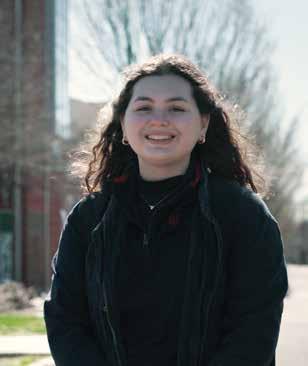
This is where the Early Identification Program (EIP), Mason’s college preparatory program for first-generation students in partnership with area public school systems, helped this former Fairfax High School student follow her dream of medical school and becoming a neurologist.
“I knew I wanted to make a difference. I wanted to make an impact on the world,” says Maravi. “EIP helped me strive for
higher education. [They] gave me a support system and helped me get that push and have that confidence in pursuing college.”
Not only was Maravi able to secure a spot as a University Scholar, a program that provides tuition and fees for high-achieving students, she also received a Merten-Womble Scholarship, which is an endowed award that supplements a University Scholar award by covering room and board.
“Without EIP, I wouldn’t have gotten to where I am,” says Maravi. “I hope to pay it forward one day to help a student who is in the same situation to achieve their dreams.”
PHOTO BY BEN POWELL
36 | SPIRIT.GMU.EDU
PHOTO BY BEN POWELL
SUPPORT MORE STUDENTS LIKE THESE PATRIOTS. GO TO GIVING.GMU.EDU.
JORDAN HASSANI
PSYCHOLOGY, DEAN’S CHALLENGE SCHOLARSHIP AND 2022 ALUMNI CHAPTER SCHOLAR AWARD RECIPIENT
Honors College student Jordan Hassani, BS Psychology ‘23, has been involved in Mason research since arriving on campus his freshman year from his hometown of San Diego, California.

After taking a class on executive function with Mason psychology professor Sabine Doebel, he asked to work in her lab. Since then, he has been a research assistant in the Developing Minds Lab, where the work focuses on executive function and working memory in preschoolers. He recently completed his honors thesis with Doebel as his advisor and received the Outstanding Honors Thesis Award. His peers also voted him Best Honors Researcher.
During his time at Mason, he received a Dean’s Challenge Scholarship from the College of Humanities and Social Sciences, an award that was established in 2007 to acknowledge exceptional
undergraduates who have excelled while making academically challenging choices. More recently, he received the 2022 Alumni Chapter Scholar Award. He says he has also received travel grants from Mason that have enabled him to present his research at conferences.
“College is incredibly expensive, so every bit helps,” says Hassani, who aspires to one day earn a PhD. “And it is nice to be recognized.”
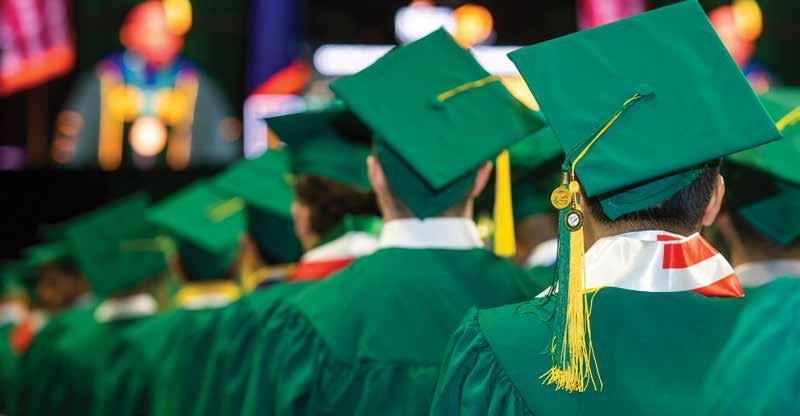
Hassani, who graduated in May, said the travel grants he received from the Office of Student Scholarship, Creative Activities, and Research (OSCAR) were critical in his development as a researcher.
“This financial assistance has enabled me to travel around the United States presenting at four different national conferences,” he says. “I am grateful for what that financial assistance has enabled me to do.”
Colleen Kearney Rich, MFA ’95, contributed to this story.
Summer 2023 MASON SPIRIT | 37
PHOTO BY RON AIRA
PINK IN THE

The iconic cherry tree grove by Mason Pond turns 30 this year. Officially known as the Memorial Cherry Grove, the first trees were donated in 1993 by the members of Club Nippon, a student organization for those who shared an interest in Japanese language and culture. The students wanted to do something different for Mason’s annual International Week and decided to make an enduring contribution to the Fairfax Campus by giving living symbols of East Asia—Yoshino cherry trees.
More than 30 trees were purchased from Merrifield Garden Center. Students planted one of these by the pond and Cross Cottage during International Week, while the Facilities Planning Office integrated the others into long-range plans for the area.
In addition to Club Nippon, the French Club, the Filipino Student Association, Global Nomads, Club Latino, the Vietnamese Student Association, and the Asian Student Union contributed toward planting the trees. Dogwood and other hardwood trees indigenous to Virginia were added to the grove later, as well as several memorial trees donated in memory of loved ones.
Learn more about Mason’s Memorial Cherry Grove.
 PHOTO BY EVAN CANTWELL
PHOTO BY EVAN CANTWELL
38 | SPIRIT.GMU.EDU
PHOTO BY CRISTIAN TORRES
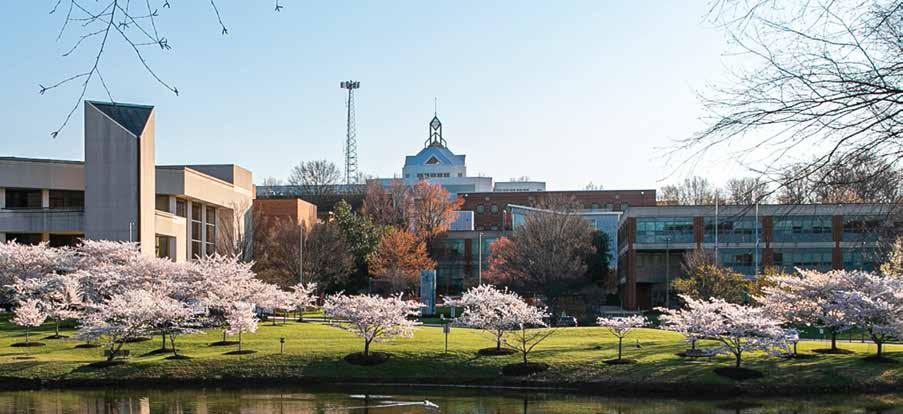
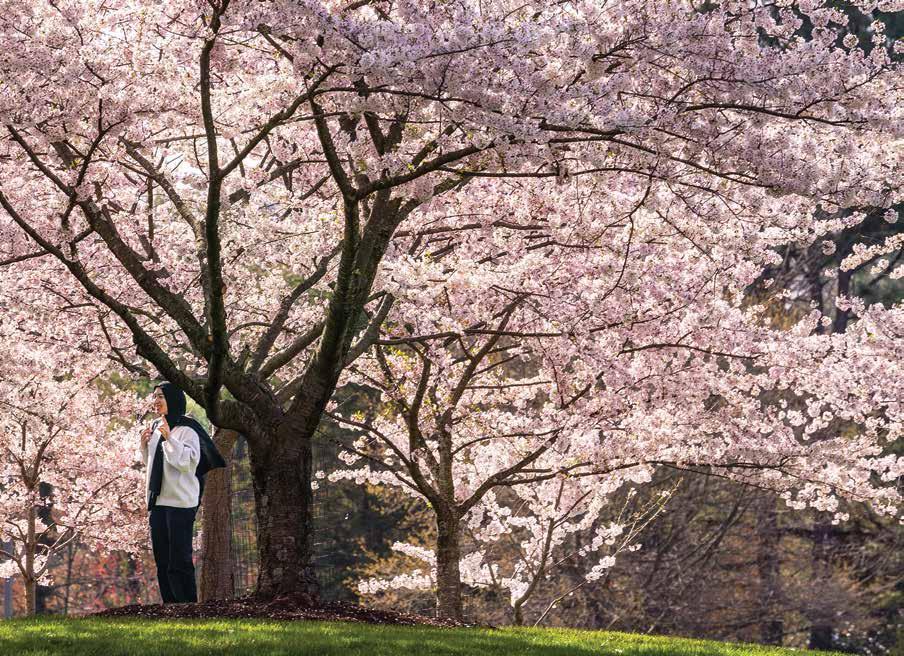
Summer 2023 MASON SPIRIT | 39
Music for the Soul—and the Mind
Nationally and internationally, many nursing homes and long-term care facilities already use music as a nonpharmacological and affordable intervention to improve their patients’ quality of life. Now, a multidisciplinary team of researchers at Mason is going one step further.
“We already know that personalized music has been shown to decrease negative psychological and behavioral symptoms for individuals living with cognitive impairment,” says Emily Ihara, chair of the Department of Social Work. “We see that patients are humming or smiling or rocking to the music. But we want to see what’s going on inside—and we have the technology now to collect that information.”
Building off a successful research project called the Music and Memory Initiative, the Mason researchers are collecting physiological data points to determine what happens to the body when those with dementia hear certain types of music.

“The goal of this project is to develop an easily accessible, automatic, personalized digital music intervention program for older adults living with cognitive impairment,” says Ihara.
The team behind the project, Smart Music Intervention Program for Older Adults with Cognitive Impairment: A Protocol Development, is developing a wearable technology device to measure things like heart rate and skin temperature in dementia patients, which will give
POINT OF PRIDE
George Mason University’s $214 million in research funding in fiscal year 2021 represented an increase of more than $100 million over five years and puts the university on track to meet its goal of $225 million by 2025.
The latest figures released by the National Science Foundation (NSF) show Mason’s research funding in the top 25 nationally in the areas of
■ Social sciences: 11th among all universities (best in the Washington, D.C., area) and eighth among public universities.
researchers some hard data on how listening to music can physically impact a person’s body.
Through the prototype development process, the research team will analyze the physiological, observational, and self-reported effects of personalized music for individuals living with dementia. This will inform how to further digitize the intervention, allowing for scale-up in a large randomized clinical trial.
—Leah Fogarty
■ Computer and information sciences: 19th among all universities and 11th among public universities in federally funded research; and 24th among all universities and 16th among public universities in total research funding.
■ Engineering: In the top 100 nationally at No. 78 (up from No. 142 in 2018) and No. 56 among public universities.
Overall, Mason’s research and development funding was 77th among public institutions, and 59th among institutions without medical schools.
INQUIRING MINDS
40 | SPIRIT.GMU.EDU
PHOTO BY GETTY IMAGES
$1.5 Million Grant Supports Underwater Explosion Research
A Mason interdisciplinary team is studying underwater explosions and their effects on civil engineering infrastructure with the support of a $1.5 million grant from the Defense Threat Reduction Agency.
“The sophisticated phenomenon in underwater explosions is important for government agencies interested in protective design,” says Mason postdoctoral research fellow Lingquan Li (pictured right), who specializes in computational fluid dynamics and mathematics.

Li is working on the project alongside principal investigators Girum Urgessa of the College of Engineering and Computing and Rainald Löhner of the College of Science. Institute for Digital Innovation predoctoral fellow Facundo Airaudo is also involved in the work.
The team has run more than 100 test cases to study the structural response and damage due to explosions. The resulting pressures and flow fields for different explosive yields and stand-off distances are provided to the Department of Defense.
“We not only develop new numerical methods and new algorithms in order to compute these explosions, but we have also delivered more than 120 results for different geometries, different loads, and different standoff distances,” says Löhner, who is director of Mason’s
Mason Lyme Test Recognized with Prize
A Mason team was named one of ten Phase 1 winners of the LymeX Diagnostics Prize by the U.S. Department of Health and Human Services and the Steven and Alexandra Cohen Foundation.
Each of the Phase 1 winners has received $100,000 and an invitation to participate in the second phase of the contest, which aims to accelerate the development of Lyme disease diagnostics for U.S. Food and Drug Administration review.
The Mason team’s work is focused on a urine test that measures proteins coming directly from the Borrelia burgdorferi Lyme-causing bacteria, providing a real-time reading on the state of the infection.
Center for Computational Fluid Dynamics Center, where these experiments have been conducted. “It has been extremely successful.”
There is a demand for experts capable of conducting blast-structure interactions and structural integrity assessments. “At Mason, we continue to mentor exceptional postdoctoral research scholars and graduate students needed to address these complex physics and engineering problems,” says Urgessa.
—Shayla Brown
“This is an important test for tick pathogens that can be used not only for diagnostics, but also to monitor the success of treatment,” says Lance Liotta, codirector and cofounder of Mason’s Center for Applied Proteomics and Molecular Medicine.

Lyme disease is the most common vector-borne disease in the United States and is most often transmitted to humans through the bite of infected blacklegged ticks. Mason’s Lyme disease diagnostics also recently received federal funding to promote use of the technology through Virginia. See page 32 for the full story.
—John Hollis
RESEARCH
PHOTO BY GETTY IMAGES
Summer 2023 MASON SPIRIT | 41
PHOTO BY CRISTIAN TORRES
Working to Improve Human-Machine Collaborations
As the use of technologies like facial recognition and smart home devices increases in daily life, many have begun to question the morality of these inventions, the ethics of their use, and how our own biases and worldviews impact the development of these smart tools.
Mason researcher Elizabeth Phillips is working with collaborators around the country to answer these pressing questions about artificial intelligence (AI) and robotics in her role as the principal investigator for the university’s Applied Psychology and Autonomous Systems Lab (ALPHAS).
The ALPHAS Lab studies how to make robots, computer agents, and AI into better teammates, partners, and companions. While computer science seems like the obvious field for this work, social sciences and humanities are critical to the development of effective, ethical, and efficient machines that humans can work with and alongside long term.
Student and faculty researchers in ALPHAS are exploring the benefits of using social robotic animals as therapeutic tools, how robots might conceptualize socialization norms to better fit into our lives, and how robots might justify and define morality in their actions, for example.
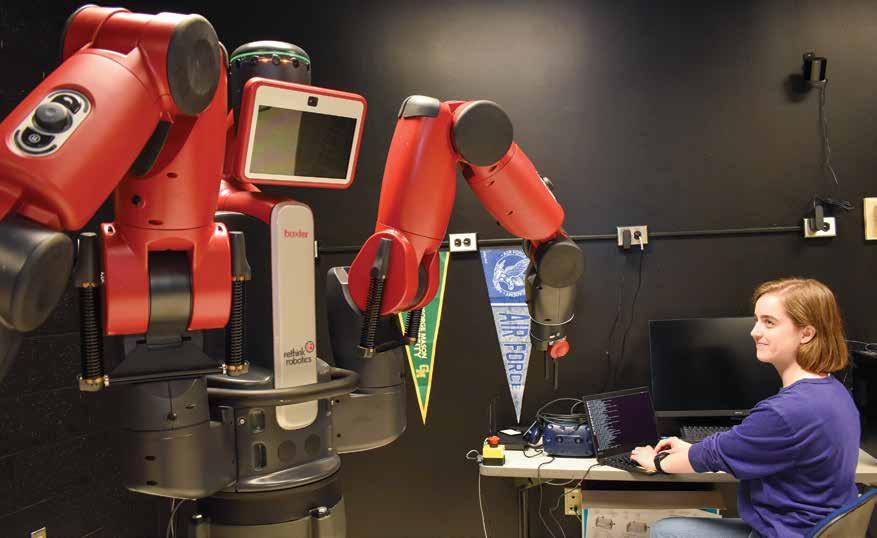
“You have to know a lot about humans in order to create successful robotics,” says Phillips, an assistant professor in human factors and applied cognition in the Department of Psychology. “How humans interact, how they work together, how they build trust in each other—these are the same building blocks in understanding how humans might interact with machines and can help us better establish how people might build trust in a variety of autonomous machines.”
One of the lab’s projects, “Improving Human-Machine Collaborations with Heterogeneous Multiagent Systems,” was a recipient of the 2022 Seed Funding Initiative from Mason’s Office of Research, Innovation, and Economic Impact in support of the Institute for Digital Innovation. This project will be done in collaboration with coinvestigators Ewart de Visser, PhD Psychology ’12, and Lt. Col. Chad Tossell, both of the Air Force Academy, and Air Force Academy cadets slated to commission as officers in the U.S. Space Force.
—Sarah Holland
INQUIRING
Mason graduate student Lydia Melles works with Baxter, an industrial robot by Rethink Robotics.
MINDS
42 | SPIRIT.GMU.EDU
PHOTO BY SARAH HOLLAND
Translating Stage Skills to Life Skills
When Mason researcher Thalia Goldstein studies children involved in theater, she looks at the skills they’ve gained in both acting and in life.
Goldstein studies how participating in theater helps children develop essential life skills and better communicate with others. For the past six years, her longitudinal study has followed more than 1,000 theater students ages 5 to 18, looking at the effects of formal theater activities on their social and emotional skills.
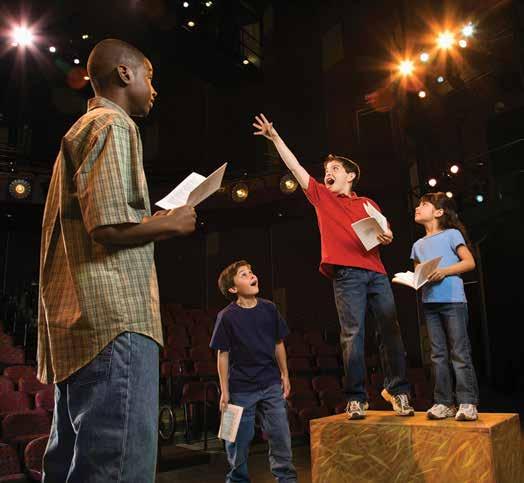
“The great thing about psychology is you can use the tools and techniques to study basically anything, and I use them to study acting, theater, play, and imagination,” says Goldstein, an associate professor of applied developmental psychology and one of the directors of the Mason Arts Research Center, a National Endowment for the Arts lab.
For the study, theater teachers rate students at the beginning and end of each semester on socialemotional skills, such as communication, creativity, teamwork, initiative, and problem solving. Goldstein and her research partners then take that data to see what effect theater has had on different aspects of the students’ personalities.
Julane Havens works with Goldstein and had already collected years’ worth of research from her previous position at the Commonwealth Theatre Center (CTC) in Louisville, Kentucky. Mason psychology PhD student Megan Stutesman is also part of the team.
“Theater has a sense of containment that means students are free to do all sorts of things they might not feel comfortable doing in the real world,” says Goldstein.
For example, within the confines of a practice space, a group of three students might be asked to improvise a scene where they are waiting at a bus stop. In following through, the students end up relying on one another throughout the exercise, getting to know one another, and understanding how their peers are thinking—which in turn builds teamwork, communication, problem solving, and more. The students also work with complex plays, scripts, and characters.
“The arts are a potential place for children to better themselves and improve the skills that they may not be getting in a traditional academic classroom,” says Stutesman. “Theater and other performing arts are a space where kids can practice and utilize those skills.”
—Shayla Brown
HAS
THEATER
A SENSE OF CONTAINMENT THAT MEANS STUDENTS ARE FREE TO DO ALL SORTS OF THINGS THEY MIGHT NOT FEEL COMFORTABLE DOING IN THE REAL WORLD.
—Thalia Goldstein
RESEARCH Summer 2023 MASON SPIRIT | 43
PHOTO BY GETTY IMAGES
States of Liberation: Gay Men between Dictatorship and Democracy in Cold War Germany

Samuel Clowes Huneke, assistant professor, History and Art History
University of Toronto Press, February 2022
This book tells the story of how the two German states persecuted gay men and how those men slowly, over the course of decades, won new rights and created new opportunities for themselves in the heart of Cold War Europe.
International Handbook of Population Policies

John F. May and Jack A. Goldstone, professors, Schar School of Policy and Government
Springer, July 2022
This book provides a comprehensive look at international population policies, including theoretical foundations, new challenges, and the historical and empirical evidence for policy formation.
A

Righteous Smokescreen: Postwar America and the Politics of Cultural Globalization

Sam Lebovic, associate professor, History and Art History
University of Chicago Press, May 2022
This book provides an examination of how the postwar United States twisted its ideal of “the free flow of information” into a onesided export of values and a tool with global consequences.
Blue Billy: The New Royal Mysteries
Lauren Ellen Scott, MFA Creative Writing
’93, professor, English
Pandamoon Publishing, May 2022
In this novel, three characters look to uncover a campfire story legend called Blue Billy that has affected their lives in unimaginable ways. They’re out to prove Blue Billy is responsible for the many crimes in New Royal.
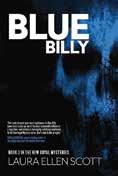
Approaching a Pedagogy of Game Writing
Seth Hudson, associate professor, Computer Game Design
Routledge, July 2022
Based on a two-year qualitative study, gathering data through conversational interviews, Hudson combines theory, practice, and his experience as an educator-researcher to shed light on the phenomenon of game writing and writers who drive innovation in game storytelling.

Racial Injustice and Nonviolence
Education: Building the Beloved Community One Block at a Time
Arthur Romano, assistant professor, Carter School for Peace and Conflict Resolution
Routledge, July 2022
This book examines the role that communitybased educators in violence-affected cities play in advancing Martin Luther King Jr.’s nonviolent vision for racial and social justice.
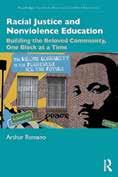
Islamic Ethics: Fundamental Aspects of Human Conduct
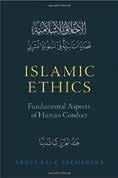
Abdulaziz Sachedina, IIIT Chair in Islamic Studies, Religious Studies
Oxford University Press, July 2022
This text digs deeper into what Sachedina calls “juridical ethics” in modern Islam and why it’s important to go beyond traditional ethics of virtue and human character to find morality in a constantly changing, modern world.
Building Resilient Energy Systems: Lessons from Japan
Jennifer F. Sklarew, PhD Public Policy ’15, assistant professor, Environmental Science and Policy
Routledge, November 2022
Taking inspiration from Japan’s narrative and understanding of energy system resilience, this volume looks at key factors that affect energy system transitions, shocks, and stakeholder relationships using case studies between the 1970s oil crisis through the 2011 Fukushima Daiichi nuclear disaster.

SHELF LIFE 44 | SPIRIT.GMU.EDU
Recently published works by Mason faculty
Virginia’s Lost Appalachian Trail Mills Kelly, director, Roy Rosenzweig Center for History and New Media

The History Press, February 2023
A historian and lifelong hiker, Kelly tells the story of a 300-mile section of the Appalachian Trail that is all but forgotten by hikers, but not by the residents of the Southwestern Virginia counties that the trail once crossed.
Racializing Media Policy
Jason A. Smith, MA Sociology ’11, PhD ’19, research affiliate, Center for Social Science Research, and Richard T. Craig, associate professor, Communication
Emerald Publishing, February 2023
With research that merges subfields of racialization and media policy, this book explores the U.S. broadcasting policy, examines racialization without integration and mediating structural challenges, and uses case studies to consider the ways that media policy spaces are embedded with ideologies and praxes surrounding race.
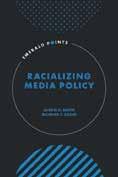
The Adventure of the Castle Thief and Other Expeditions and Indiscretions
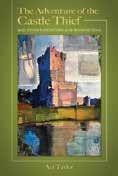
Art Taylor, MFA Creative Writing ’06, associate professor, English
Stanford University Press, February 2023
This second short-story collection from Edgar Award-winner Taylor spans the spectrum of crime fiction from light-hearted traditional mystery and noir-tinged tales to speculative fiction.
THE NEW CHINESE WAY OF DEATH
In her new book, Governing Death, Making Persons: The New Chinese Way of Death (Cornell University Press, January 2023), Mason anthropology professor Huwy-min Lucia Liu explores how economic reforms and changes in the management of death in China have affected the governance of its people.
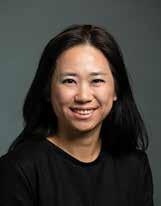
What inspired you to write this book?
Before I started my fieldwork, I had assumed that I would be going to witness the rise of new death rituals, ones that emphasized individuality. I had also assumed that I would see the reemergence of religious funerals. Of course, when I got there, I found things were very different from what my readings of other areas of social life had led me to assume. Death in urban China had undergone drastic changes under the Chinese Communist Party since 1949 and then again since the beginning of the reform period in the 1980s. We know that the Chinese state nationalized funeral industries—along with other industries—and repressed traditional death rituals. Beyond this, scholars knew very little about death in urban China. Exploring the new Chinese way of death was a way for me to understand the intended and unintended consequences of constructing citizenship and subjectivity in contemporary China.
Was there anything that surprised you in the research of this book?
Two things surprised me. First, most people living in Shanghai preferred to commemorate the dead with a particular style of funeral called “memorial meetings.” This ritual is a secular civil ritual that uniformly commemorated the dead as model socialist citizens. This finding was surprising because after the introduction of the market economy in the 1980s, the Chinese Communist Party actively discouraged people from performing this ritual. What’s even more surprising was that the most common death rituals in Shanghai were religious versions of this secular socialist civil funeral. How could it be possible to have a ritual that both denies and recognizes spirits and the afterlife at the same time? In my book, I unpack these puzzles.
What are you working on now?
I am working on two new projects. Both projects are about governing nature. The first project tackles how and why the Chinese government developed an American national park system with Chinese characteristics. [Mason] Libraries’s Fenwick Fellowship is currently supporting my work on this project. The second project explores how Taiwan (Formosan) black bears were transformed from a not-so-wellknown subject of conservation activism for biodiversity to a national totem representing Taiwan internally and externally.

Summer 2023 MASON SPIRIT | 45
PHOTO BY CREATIVE SERVICES
Preparing Nurses for Disaster Management
Joanne Langan, PhD Nursing Administration ’99
Using case studies and personal testimonies from nurses, Preparing Nurses for Disaster Management (Elsevier, February 2022) equips readers with guidelines to plan for unexpected disasters, both natural and man-made. Langan compiles references to help build confidence in a broader audience.
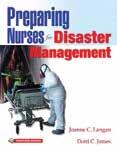
Langan has been featured in many research articles that specialize in response recovery and disaster management. She currently teaches at Saint Louis University in Missouri.
The Presidents in Quirky Illustrated Verse
David Holland, BS Electrical Engineering ’04
The collected poems in The Presidents in Quirky Illustrated Verse (Fulton Books, June 2022) take readers on a comedic journey all the way to current U.S. President Joe Biden.
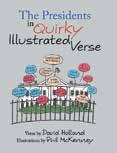
Holland is a writer, veteran, and former federal government employee.
The Enigma of Father Vera Daniel
Michael
Gryboski, MA History ’15
In The Enigma of Father Vera Daniel (Ambassador International, July 2022), Gryboski tells the tale of a parish priest named Father Vera Daniel in the Kingdom of Parvion. His mysterious past puts him in danger amid the kingdom’s constant warfare, economic struggles, and the need for revolution.
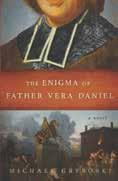
Gryboski has worked with The Christian Post since 2011 writing articles covering politics, court cases, and other notable religious events. He resides in Richmond, Virginia.
100 Years of Baseball on St. Petersburg’s Waterfront: How the Game Helped Shape a City

Rick Vaughn,
BSEd Health Education ’79
100 Years of Baseball (The History Press, August 2022) brings readers through notorious historical baseball events in St. Petersburg, Florida, with anecdotes, statistics, and more.
Vaughn has more than 30 years of experience in professional sports, including with Major League Baseball’s Baltimore Orioles and

Tampa Bay Rays, as well as the NFL’s Washington Commanders. He is now the executive director of Joe Maddon’s Respect 90 Foundation.
A-Drift
Amy-Sarah Marshall, MFA Creative Writing ’01
Using oceanic comparisons to thoughtprovoking struggles, A-Drift (Finishing Line Press, September 2022) dives into a collection of poems that explores the bodies we are born in and how magical, yet stressful, they can be.

Marshall’s poetry has been featured in journals such as Phoebe, So to Speak, and The Dewdrop, among others. She manages content for the University of Virginia’s health department located in Charlottesville, Virginia.
There Is No Box: A Practical Guide for the Relatable Leader
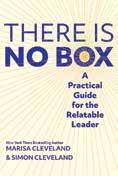
Marisa Cleveland, BA Speech Communication ’97, MAIS ’01, and Simon Cleveland, BS Marketing and Management ’98
In There Is No Box (Matt Holt, November 2022), the Clevelands combine their 40 years of professional experience to guide readers on how to become effective and meaningful leaders.
Marisa is the executive director of the Seymour Agency, a New York Times bestselling author, and an adjunct professor at Southern New Hampshire University. Simon has extensive knowledge and experience with corporate institutions and in higher education, such as at Georgetown University and John Hopkins University, where he lectures.
The Remarkable Reefs of Cuba: Hopeful Stories from the Ocean Doctor
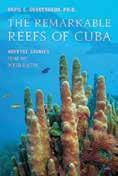
David Guggenheim, PhD Environmental Science and Public Policy ’98
Guggenheim writes about his adventures along Cuba’s reefs in The Remarkable Reefs of Cuba (Prometheus, November 2022).
Guggenheim is a marine scientist, educator, and submarine pilot who has made appearances on TV shows such as Good Morning America and 60 Minutes. He is also the founder and president of the nonprofit organization Ocean Doctor based in Washington, D.C.
ALUMNI IN PRINT 46 | SPIRIT.GMU.EDU
Recently published works by Mason alumni
DINESH KARRI
Many people dream of flying through the sky in a Quidditch game straight out of the world of Harry Potter. While Mason PhD student Dinesh Karri, MS Electrical Engineering ’19, isn’t personally reaching new heights in a Quidditch match, his team’s technology is.


It’s a…Shark Blimp: A lighter-than-air (LTA) robotic shark blimp, to be exact. Three years ago, Karri started working with his academic advisor, Mason engineering professor Cameron Nowzari, on an LTA project funded by the Office of Naval Research (ONR). The goal is to develop a minimally viable swarm of robots that can safely maneuver and achieve their mission in a unique environment. ONR supports this project at universities across the country, and teams all meet up at the biannual Defend the Republic game to test their new technology, learn from each other, and compete in a Quidditch tournament. “It’s a great chance to see what other people came up with. It’s always different than what your team thought of,” says Karri.
The Best Advice? Fail Fast: Nowzari gave Karri some of the best advice that he employs both inside and outside the research lab. “Learn first, test fast, fail fast, and get better,” says Karri. “I’m not sure if he meant it to be such impactful advice, but for me, it is.” In research, things rarely go as planned the first time around. But if you keep waiting for everything to be perfect, or you’re afraid to even try, you won’t be able to learn. “You can’t know what’s wrong until you test your work,” Karri says. Even if a test fails, he believes he is still that much closer to the solution.
YEAR: PhD Student
MAJOR: Electrical and Computer Engineering, Controls and Robotics
HOMETOWN: Hyderabad, India
Doing His Homework: Karri came to the United States from India in 2017 to attend graduate school. He says he applied to Mason because it offered robotics and was in the Washington, D.C., area, but his research did not stop there. “I reached out to a lot of alumni to get information on the educational prospects, and I got a very positive response, which pushed me toward choosing Mason.”
The Quality of the Question: Karri admits that his PhD has been a rollercoaster ride. But his mentors have taught him that even when the ride seems to be going off track, you’re still learning. “You’re always learning how to ask quality questions and find new ways to answer them,” he says. “When I started my research, my professors let me ask some dumb questions, but they never saw them that way. They always gave me a chance to learn.”
—Ryley McGinnis
PATRIOT PROFILE
Learn more about how the Mason team did at the Defend the Republic Game hosted this year by Mason.
Summer 2023 MASON SPIRIT | 47
PHOTOS BY DERON ROCKINGHAM
Bringing Mason and Fairfax City Together
“Just so you know,” Catherine Read, BA Government and Politics ’84, says in a recent conversation, “I’ve got more ideas than a dog has fleas.”
And new ideas are exactly what she says are needed for George Mason University and Fairfax City to come together in a partnership that will benefit both.

“You look at our downtown and where are the students, where is the energy?” says Read, the first Mason alum and first woman to be Fairfax mayor. “I’m thinking, ‘We live next door to the largest public university in Virginia, so what is the city not doing well? What kind of things can we do between the campus and the city?’”
While at Emerson, Read took a class on political thought that she called “a clarion call to switch to [a] passion I’ve had since elementary school: history and politics.” That background, later nurtured and expanded at Mason, guided the legislative advocacy work with nonprofits that occupied much of Read’s past 10 years. Her biggest wins include successfully helping the Virginia Autism Project lobby for autism insurance reform that, when it passed in 2011, required insurance companies to provide medically necessary behavioral therapies.
Read also helped the Virginia Alliance for Breastfeeding Laws successfully push for a 2015 law that allows mothers to breastfeed their children anywhere the mother is lawfully present.
“When you talk about what are you going to do with a degree in government and politics, you have to understand how the political system works and you have to help other people understand how good policy gets made,” says Read. “Being mayor is being able to make that kind of difference, but I have a bigger platform.”
That platform includes building a bench of young, hungry political talent in Fairfax and establishing a “21st-century culture in a city that has been very traditional up until this point.”
And that’s where Read’s ideas to build bridges between Mason and Fairfax come in.
Already there are plans for a June Pride celebration and something informally called the “CUE Crawl: A pub crawl without alcohol” that will have incoming students riding the free City-University Energysaver (CUE) Bus through Fairfax and stopping at restaurants that will serve food, mocktails, and nonalcoholic beer during Welcome Week.
Read is passionate about building that relationship, given that her own bond with Mason is foundational to her personal and career arc. She grew up in Southwest Virginia and came to Mason as a transfer from Emerson College in Boston, where she was a theater major. She knew of Mason only because Emerson’s forensics team, of which she was a part, consistently lost to the powerful Patriot squad.
“I’ve got skin in the game,” Read says. “My degree has grown in value as Mason has grown in stature in Virginia and globally. I consider it an amazing return on investment.”
—Damian Cristodero
48 | SPIRIT.GMU.EDU CLASS NOTES
PHOTO BY CRISTIAN TORRES
1960s
Gregory Zirzow, BS Biology ’69, is retired after decades as a scientist with the National Institutes of Health. He spends his time supporting charities that help those who require assistance in caring for sick children.
1970s
Bonnie Atwood, BS Psychology ’74, was recognized by the Metropolitan Business League for her outstanding contributions to the greater Richmond community this year. She is editor of Virginia Capitol Connections Quarterly Magazine.
1980s
Daniel Leedy, BA Government and Politics ’80, was reelected to a fifth term as judge of the County Court of Law of Austin County, Texas.
Greg Ohanesian, JD ’80, is president of the South Carolina Bar’s Senior Lawyer Division, and is a member of the bar’s Board of Governors and the House of Delegates. He is the founder of Ohanesian & Ohanesian, with offices in Bennettsville and Myrtle Beach, South Carolina. He recently hosted U.S. Marine Corps birthday celebrations, annual events on the corps’
traditional founding date, in three counties.
Kathleen Dickinson, BA Psychology ’82, is the Nevada state coordinator for the Center for Civic Education and the executive director of the Nevada Center for Civic Engagement. In those roles, she coordinates trainings and events for K–12 teachers and students throughout the state, deepening content knowledge in history and providing 21st-century skills for students.
Greg Paspatis, BA History ’83, retired from his career as a civilian employee of the U.S. Marine Corps at Henderson Hall in Arlington, Virginia, in August 2022.
Kelly Peaks Horner, BSEd Early Education ’85, MEd Education Administration and Supervision ’91, is the coauthor of Unwrapped: The Pursuit of Justice for Women Educators, published by Tandem Light Press in January. She is founder and CEO of Horner Education Consulting Group, where she is an executive education leadership and culture coach and Dare To Lead facilitator. She is also a cofounder of The Lucy Leadership Project to support and develop women in education leadership.
George Harold Waxter, MS Electrical Engineering ’88, was diagnosed with cerebral astrocytoma in 2015 and was given four to seven years to live. He underwent brain surgery followed by radiation treatment and chemotherapy over the course of a year. At the time, he was told that there had been 60 patients
who had survived past the seven-year lifespan prognosis. He reports there are now 61, as he has lived seven years and 10 months since his diagnosis.

1990s
Sandy Hiortdahl, MFA Creative Writing ’90, wrote the poetry collection Hang Five, to be published in June by bd-studios.com.
Monica Davy, BA English ’91, was appointed to the national board of directors of the National Kidney Foundation. She is senior vice president and chief culture, diversity, and impact officer at Vizient Inc. Davy is a living kidney donor to her son who was born in 2001 at 29 weeks and was diagnosed with Prune Belly Syndrome and kidney failure. Because he began to reject her kidney around 2011, Davy’s husband participated in a kidney swap so their son could receive a moderately matched kidney in January 2020. Today, their son is a junior at Mason.
Elaine Ward, MS Software System Engineering ’95, was nominated to the 2022 Power 100 List sponsored
by Diversity Woman Media. She is managing director of enterprise strategy and the Transformation Innovation Center at MITRE.
Donald Zimmermann, MA Telecommunications ’95, is the sole proprietor of Tele-Computing Consulting in Boynton Beach, Florida, after having held technical positions at IBM, Pressco Technology Inc., and ADT. He also holds MBA, PhD, BS, and AAS degrees.
Marcantonio Barnes, BA English ’96, JD ’06, is a partner in the corporate and securities group at Womble Bond Dickinson’s office in Tysons Corner, Virginia.
John Elink-Schuurman, MA International Commerce and Policy ’99, is director of trade and investment for Investment New South Wales, embedded within the Australia Trade Commission of the Australia Embassy in Washington, D.C.
Alexandra Hernandez, MBA ’99, is a resource mobilization specialist at the Pan American Health Organization regional office of the World Health Organization in the Americas, where she has worked since 1997. In her position, she has contributed to the response to the HIV/AIDS epidemic, the
What’s New with You?
H1N1 pandemic, the earthquake in Haiti, and the mobilization of funds in response to COVID-19.
Aileen Steere, BS Psychology ’99, is workplace accommodation analyst at General Dynamic Information Technology. She is an experienced human resources professional and has held positions at Kastle Systems and Innoviss, among others.
2000s
Serena McIlwain, MPA ’03, was appointed Maryland’s secretary of environment by Maryland governor Wes Moore. In this role, she oversees the agency that implements and enforces environmental protection laws and programs. Before joining Moore’s administration, McIlwain served as undersecretary of the California Environmental Protection Agency (CalEPA) since 2019, where she supervised the agency’s day-to-day operations and managed a budget of $22 million.
Melissa Judy, BA English ’04, is social media manager in the Northern Virginia district of the Virginia Department
(continued on page 50)
We are interested in what you’ve been doing since you graduated. Moved? Gotten married? Had a baby? Landed a new job? Received an award? Submit your class notes to alumni.gmu.edu/whatsnew. In your note, be sure to include your graduation year and degree.
Summer 2023 MASON SPIRIT | 49
As Mason embarks on its most ambitious comprehensive campaign, it is critical that all members of the university community help propel it forward. I want you, our amazing alumni, to lead from the front. The comprehensive campaign will raise funds to ensure Mason provides the best education possible, while guaranteeing its legacy of transformation. Use this opportunity to acknowledge the role Mason plays in your life and help commit to its future. Every contribution, regardless of the amount, makes a difference.
Please engage with your alma mater at this critical moment. Mason will be better for it. Your unique journey offers beneficial experiences, perspectives, and hope for our students. Please share them with us!
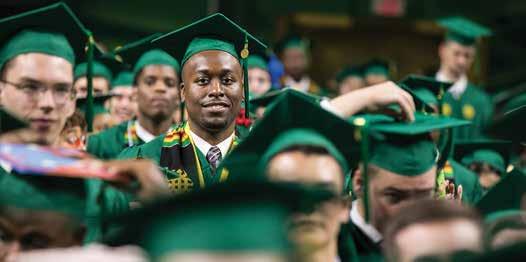
Don’t know where to start? Review our top 10 ways to be an engaged alum, and of course, in true Patriot spirit, feel free to create your own!
1. Register and/or update your information in the alumni community.
2. Engage with your academic and/or affinity chapter or a regional network.
3. Support alumni scholarships
4. Ask if your employer has a matching gift program.
5. Visit the alumni events calendar and encourage five alums in your network to participate—or even better, join you!—in an in-person or virtual event.
6. Complete our volunteer interest form.
7. Submit a class note
8. Register your alumni-owned business in our Patriot Businesses Directory (and support an alumni-owned business while you’re there).
9. Follow and tag us on social media: @MasonAlumni.
10. Wear your green and gold with Patriot Pride when you are out and about. A comprehensive campaign of this scope will transform Mason’s future, building on its strong foundation of changing lives and livelihoods, near and far. Look at all that has been accomplished since Mason’s founding. If you are close to one of our campuses, come see for yourself! Or visit gmu.edu for a glimpse into the university’s transformation and the reputation it garners worldwide.
Be a part of Mason Now and help us Power the Possible!
Christine Landoll, BS ’89, MS ’92
President, George Mason University Alumni Association
of Transportation. She is the first person to hold the position, in which she engages with the community through the organization’s Twitter account. She and Brian Jones, MA ’06, are engaged.
Brian V. Lee, JD ’04, is in his 15th year as lead attorney of Lee Legal, where he focuses on bankruptcy, foreclosure defense, business turnaround, and civil litigation. Since beginning his practice in 2004, he has helped thousands of businesses and individuals in financial distress.
Lisa Floresca Shapiro, BA Psychology ’04, MEd Educational Psychology ’06, is assistant director of entrepreneurship programs in the Office of Entrepreneurship and Innovation at Mason. Previously, she was program coordinator for the statewide Innovation Commercialization Assistance Program, a joint program between Mason and the Virginia Small Business Development Center Network. She also is pursuing her MBA at Mason.
Trevor Basil, BS Psychology ’06, has earned a doctoral degree from the University of California, Riverside, in social/ personality psychology in 2021. He is an adjunct psychology professor at San Jose State University.
Matthew Norman, MFA Creative Writing ’06, has published his fourth novel, Charm City Rocks (Dell, June 2023), a comedic romance between a single dad and his childhood crush, who returns to the spotlight after a documentary about her rockstar days comes to the forefront. Norman resides in Baltimore, Maryland, with his wife and two children.
Neville Barbour, BA History ’07, hosted a solo exhibition of his drawings at Hillyer Contemporary Art Gallery in Dupont Circle, Washington, D.C. His work also is on display at the Museum of Science and Industry in Chicago for their Black Creativity exhibition and at the African American Museum in Dallas, Texas, for their Carroll Harris Simms National Black Art exhibition. One of his drawings is in the permanent collection of the David Driskell Center for the Study of Visual Arts and Culture of African Americans and the African Diaspora at the University of Maryland. He is a senior associate in external affairs at the Pew Charitable Trusts.
John Carter, BIS ’07, was promoted to human resources director in January at SERVPRO Team Wall.
Helene Kwong Kane, BS Marketing ’07, received the 2022 Marketer of the Year award at Vertafore Inc. for her work on the company’s commercial submissions product launch. She is product marketing manager at Vertafore, headquartered in Denver, Colorado, and is a pro member of the Product Marketing Alliance.
Maria Leonisa Ortiz Bolivar, MA International Commerce and Policy ’09, is a program manager supporting 15 countries for the World Customs Organization-SECO Global Trade Facilitation Programme.
Taylor Brown, JD ’09, is senior attorney and practice lead of the IBM U.S. federal government contracts legal team. Prior to his current position, he was assistant general counsel at PAE.
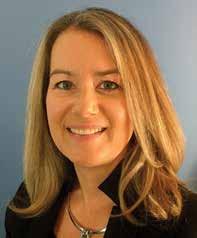
PHOTO PROVIDED CLASS NOTES
50 | SPIRIT.GMU.EDU
Ayesha Rahmanyar, BS
Biology ’09, is compliance manager at Blink Health, where her position combines her passions for health care and technology. Blink Health is a digital health company with the mission of making prescriptions more accessible and affordable.
2010s
Nicole Asselin, MA Arts Management ’10, is the author of Concession Stand Crimes, the second book in her Ballpark Mysteries series published in June 2022 by Pandamoon Publishing. The first book in the series, Murder at First Pitch, was published in 2019. She is also a technical writer/editor at NTT DATA in Quincy, Massachusetts.
Alyssa DaCunha, JD ’10, is a partner at WilmerHale in the response group and is co-chair of the firm’s congressional investigations practice group. She received the National Law Journal’s 2022 Congressional Investigations and Government Oversight Award and is considered the go-to crisis manager and attorney for CEOs and corporate executives preparing to testify before the U.S. Congress. DaCunha is a personal advisor to three cabinet secretaries and has been integral to many of the highestprofile U.S. Congressional investigations during the past decade.
Kathleen Ivchenko, MAIS ’11, wrote Awkward Stumbles and Fuzzy Memories: Memoir of a Peace Corps Volunteer, self-published in February 2021. It is her story of being a young woman who left her small hometown for an
(continued on page 52)
The Write Stuff
Graduate school is where Henry “Hank” Jones, BA English ’07, MA ’10, first dreamt of becoming a film and television writer. He attended writing courses at film festivals, read scriptwriting books, and watched any movie he could on Netflix. “This was back when they still mailed DVDs,” he says. His study of the craft has paid off, with writing credits that include shows such as Motown Magic, Family Reunion, The Neighborhood, Grown-ish, Bel-Air, Truth Be Told, The Game, Black-ish, The New Edition Story, and Dear White People. He is currently a writer and producer on ABC’s Will Trent.
Jones, the first African American Mason alum to write for a dramatic network television series, says the road to success was not easy. “I faced self-doubt, doubt from others, poverty, joblessness, breakups, isolation...I can keep going.”
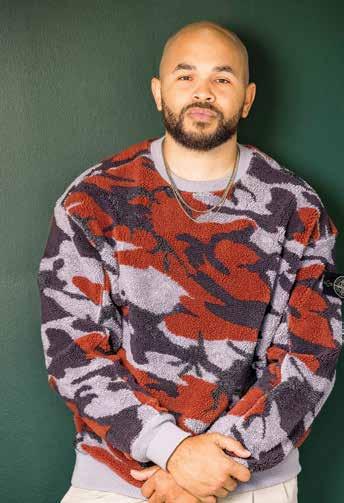
He recently shared what he’s learned from his journey and what’s next.
What were your career goals when you enrolled at Mason as a freshman in 2003?
I transferred to [Mason] after changing my major from communications (advertising) to English. My freshman composition instructor at my previous college told me I needed to focus on writing as a career. I still wasn’t sure what type of writing—and I knew I loved movies—so I concentrated on film and media studies with the thought of being a movie critic/ entertainment journalist.
What advice would you give to someone who wants to break into TV writing?
Write from the most personal place you can with your samples. Don’t worry about what you think audiences might like or what’s hot right now. Your truth will always be more interesting and evergreen—and that’s what people will respond to the most. Afterwards, revise your script until you hate it. Once that’s done, submit it to any writing contest or program. Sundance, American Black Film Festival,
Austin Film Festival, Film Independent’s Episodic Lab, and Project Involve are all great options. This will get you the attention you need to get into TV writing— especially if you’re doing it from outside Los Angeles.
What can we expect from you next?
2023 is the year I get both feet into the feature [film] world. I have a few projects I’m writing and hoping to sell. I’ll keep y’all posted!
—Jessica A. Smith, BA ’14
CLASS NOTES
Summer 2023 MASON SPIRIT | 51
PHOTO BY VAN GREEN
Are you an alum who owns a business?
List it in our alumniowned business directory.
Go to go.gmu.edu/ alumnibusiness to find out more.
adventure with the Peace Corps in Ukraine.
Saad Husain, BS Finance ’12, BS Accounting ’12, is director of operations at The Halal Guys, a franchise restaurant specializing in food that is permissible under Islamic law. Husain has been with the company for seven years and was the first The Halal Guys franchise operator in the region. He recently brought the fast-casual dining option to campus, with the opening of The Halal Guys in the Johnson Center.
Josh Kurtz, MPP ’12, was appointed Maryland’s secretary of natural resources by Maryland governor Wes Moore. As secretary of natural resources, Kurtz leads an agency with 1,352 employees and a $578 million budget. Previously, Kurtz
was Maryland executive director of the Chesapeake Bay Foundation and government relations director of the Nature Conservancy.
Diane Wetzel Mahoney, MBA ’12, is director, HR business partner at BBB National Programs, a mission-driven nonprofit organization that helps businesses enhance consumer trust and gives a voice to consumers.
Lauren Stetz, MA Art History ’12, received the 2023 Elliot Eisner Doctoral Research Award in Art Education Award. She earned a PhD in art education from Pennsylvania State University in 2022. She is adjunct associate professor of art education and curriculum consultant of art and design education at the University of the Arts in Philadelphia, Pennsylvania.
Karyn Onyeneho, MS Health
Informatics ’14, is advisor for genomic data sharing at the National Institutes of Health, National Institute on Aging (NIA). In her role, she develops, implements, and analyzes genomic data-sharing policy and oversees policies and procedures governing trans-NIH genomic datasharing functions for the NIA. She is also chair of the Data Access Committee, overseeing data access requests for the Database of Genotypes and Phenotypes. Onyeneho is an expert in genomics, bioinformatics, biomedical data analysis, policy implementation, and large-scale coordination and collaboration. She holds a PhD in nutrigenomics from Howard University.
Mark Elliot Bergman, DA Community College
Education ’15, won the
2022 International Society of Bassists’ (ISB) research competition for his article “E-portfolios as Learning Tools for Applied Double Bass Study; a Research-Based, Practice-Oriented Approach.” The article appears in an upcoming edition of ISB’s academic journal, and he is scheduled to present his research at the 2023 ISB convention in Ann Arbor, Michigan. He is the director of strings and orchestral studies at Sheridan College in Sheridan, Wyoming.
Rose Mary Bellamy, BS Criminology, Law and Society ’16, is COO and founder of Grandpa Foods, a maker of apple butter-based barbecue sauce and all-purpose and no-salt seasonings. Products can be ordered online (grandpafoods.com) or found in various locations (continued on page 54)
GEORGE MASON UNIVERSITY ALUMNI ASSOCIATION BOARD OF DIRECTORS 2022–23
Christine Landoll, BS ’89, MS ’92, President
Scott Hine, BS ’85, President-Elect
Sumeet Shrivastava, MBA ’94, Immediate Past President
Darcy Kipp Kim, BS ’02, MPA ’20, Vice President, Alumni Engagement
Melissa Lewis, BA ’04, MA ’09, Vice President, Student Engagement
Janay Phillips, BA ’09, Vice President, Volunteerism
Ailsa Ware Burnett, BS ’93, MA ’96, MPA ’08, Vice President, Partnerships and Sponsorships
Cathy Lemmon, BA ’86, MA ’93, Historian
Keith Callahan, BS ’86, Treasurer
Steve Kann, BA ’85, Director-at-Large (2021-23)
Jimmy Martin, BA ’07, Director-at-Large (2021-23)
Molly McLaurin, BA ’08, Director-at-Large (2021-23)
J. Thomas Hennessey Jr., PhD ’97, Director-at-Large (2022-24)
Halleh Seyson, BS ’00, Director-at-Large (2022-24)
Kristen Taylor, BA ’88, Director-at-Large (2022-24)
Deidra Bailey, BA ’09, MEd ’11, President, Black Alumni Chapter
Fitz Shipp, MS ’12, President, Carter School for Peace and Conflict Resolution Alumni Chapter
David P. Brown, PhD ’04, President, College of Engineering and Computing Alumni Chapter
Cheryl Rice, BA ’88, JD ’91, President, College of Humanities and Social Sciences Alumni Chapter
Kathi Huddleston, PhD ’08, President, College of Public Health Alumni Chapter
Mark Monson, BS ’74, President, College of Science Alumni Chapter
Molly Grimsley, BA ’81, President, College of Visual and Performing Arts Alumni Chapter
Sawyer Dullaghan, BS ’15, President, Green Machine Ensembles Alumni Chapter
Melissa Alberto, BA ’19, President, Honors College Alumni Chapter
Michael D. Marino, BA ’11, President, Lambda Alumni Chapter
Daniel Logroño, BS ’20, President, Latino Alumni Chapter
Brennan Georgianni, MPP ’16, President, Schar School of Policy and Government Alumni Chapter
Pamela Maines, MBA ’09, President, School of Business Alumni Chapter
Chris Jones, MA ’99, President, Veterans Alumni Chapter
If you would like to become involved in the Alumni Association, please contact the Office of Alumni Relations at alumni@gmu.edu.
CLASS NOTES 52 | SPIRIT.GMU.EDU
On a Mission
When Alaleh Jenkins, BS Accounting ’97, immigrated to the United States as a teenager, she didn’t speak English. As a George Mason University student, she enrolled in basic English classes and quickly became fluent while also excelling in her other courses.
Focused on academics, as well as adjusting to and succeeding in a new country, Jenkins took advantage of Mason’s many job fairs, landing two internships during her time at Mason and a job at a major certified public accountant firm after graduation. Jenkins’s steady work ethic throughout the years led to her recent designation as the acting assistant secretary of the U.S. Navy for financial management and comptroller (ASN FM&C). She has brought lessons learned from the private sector to her new role.
“As I tell the FM&C workforce, if you don’t change, you don’t grow. It’s very important that everybody learns to work in different environments, how to work with different cultures, how to be more inclusive, how to work in a very diverse organization, and how to communicate and move forward,” she says. “For me it’s about connecting the dots, integrating, answering questions, and making sure that [Navy leadership has] the information that they need and that I have the monitoring in place across the various areas.”
No two workdays look the same for Jenkins, as she reaches out to various tiers of the organization. This busy schedule of communicating and coordinating with colleagues across not only the Department of the Navy (DON), but also with other U.S. Department of Defense and federal organizations is among her favorite aspects of the job. But the most rewarding aspect for Jenkins is the mission itself.
“I am honored and humbled to be in a position here to support our sailors, marines, and civilians who make up the DON—people who have sacrificed everything for us to live the life that we have in this country,” she says.
Reexamining her own path, Jenkins recognizes that getting exposure to new ideas, experiences, and people is critical for business students and young professionals to flourish. Her ability to work effectively with
individuals from all walks of life has enabled her to be successful in any workplace situation she has faced.
Jenkins acknowledges she didn’t always know what she wanted to do professionally. She encourages students to join clubs and take on leadership positions in order to understand what is best for the team, and how to succeed within that team’s construct.
“If there are opportunities to expand your horizon and gain experience in different areas, I highly encourage you to seize them,” she says. “You always want to be in learning mode.”
—Greg Johnson, BA ’13
Alaleh Jenkins shared her keys for success at a fireside chat with School of Business Dean Ajay Vinzé in November 2022. Students, faculty, staff, and community members gathered in Merten Hall on the Fairfax Campus for a lively discussion about Jenkins’s career.

CLASS NOTES Summer 2023 MASON SPIRIT | 53
PHOTO BY JOSHUA REED
in Virginia, Maryland, and Pennsylvania. She was featured in a profile posted on the Northern Virginia Community College website in February 2023.
Ashley Carter, BS Kinesiology and Exercise Science ’16, is associate director for university events at the University of North Carolina at Charlotte. Previously, she was assistant director for student involvement at UNC Charlotte and student program coordinator at Florida State University.
Samantha BordersShoemaker, PhD Conflict Analysis and Resolution ’19, wrote her fourth book and second poetry collection. Waiting for Scotland was published in January 2023 by Brandylane Publishers.
John Jewell, MEd Education Leadership ’19, is assistant principal at Pulaski County Middle School in Dublin, Virginia. He and his wife welcomed a baby girl in summer 2022.
Sofya Vetrova, BS Tourism and Events Management ’19, is marketing director at Mason Dining/Sodexo. She started her journey at Mason as student in the INTO Mason program and began working for Sodexo as a dining ambassador when she was a sophomore. She was then hired full time as an events coordinator prior to her current position.
the College of Education and Human Development, specializing in international education and education leadership. She says that during her time in the program, she has had “incredible professors and a wonderful cohort of women who have become such dear friends. I have truly loved my time at this amazing university and am so grateful for everything that it has brought me.”
Javed Nooriwal, MPA ’21, is the owner of a retail business, which recently expanded to a second location, and the founder of a nonprofit organization. He is a father to a new baby boy, who joins two sisters and a brother. The family resides in the Dallas-Fort Worth area of Texas.
Matthew Ferreira, MS Biodefense ’22, has been chosen as a 2023 Emerging Leaders in Biosecurity Initiative Fellow at the Johns Hopkins Center for Health Security. Ferreira is director of operations for Soteria Solutions, a firm that provides innovative solutions to complex logistics programs with a specific focus on crisis-affected areas. Previously, he was an American Association for the Advancement of Science and Technology Policy Fellow at the U.S. State Department, where he worked on international COVID-19 response operations, global health, and biodefense.
Emily Monseur, BA Art and Visual Technology ’22, is a user interface designer at EAi Technologies.
Obituaries
ALUMNI AND FRIENDS
David E. Harney, BA Chemistry ’69, d. September 14, 2022
Carolyn J. Hannebaum, BA English ’71, d. February 9, 2023
Douglas W. Hall, BS Business Administration ’72, d. September 13, 2022
John R. Spence, BA Economics ’73, d. November 30, 2022
Leona Fox Barber, MEd Education Administration and Supervision ’74, d. October 1, 2022
Darcy L. Behan, BA English ’74, d. October 19, 2022
Walter J. Bottiny, BA Economics ’74, MA ‘79, d. November 18, 2022
Carol C. Hanes, BA History ’75, d. February 13, 2023
Ellen R. Tonsing, BA English ’75, d. December 14, 2022
Mary J. Carroll, MA Psychology ’76, d. February 15, 2023
John P. Coogan, BA History ’76, d. December 16, 2022
William P. Henry, MBA ’76, d. November 25, 2022
George L. Marshall, BA Government and Politics ’76, d. November 14, 2022
Paul Milo Jr., BS Economics ’76, MA ’80, d. January 27, 2023
Steven L. Presar, BA History ’76, d. January 20, 2023
Michael W. Griffin, BS Business Administration ‘77, d. January 28, 2023
Mary A. Weaver, BA History ’77, d. November 26, 2022
David R. Newell, MA Psychology ’78, d. November 2, 2022
Wilda F. Davisson, MEd Education Administration and Supervision ’79, d. November 26, 2022
Richard E. Walters, BS Business Administration ’79, d. October 28, 2022
Julia V. Bernt, MEd Counseling and Development ’81, d. October 24, 2022
Sandra A. Hanish, RN, BSN ’81, MEd Special Education ’82, d. October 14, 2022
Joseph A. Powell, MBA ’81, d. November 18, 2022
Anne A. Sears, BA Area Studies ’81, d. September 30, 2022
Nancy A. Endler, BSN ’82, d. October 13, 2022
Martha M. Gower, BA Music ’82, d. September 30, 2022
Deborah H. Higgs, BA Psychology ’82, MEd Counseling and Development ‘84, d. November 26, 2022
Robert M. Darden, BS Law Enforcement ’83, d. October 11, 2022
Nancy Re, MEd Curriculum and Instruction ’83, d. January 12, 2023
Russell R. Babington, BA Speech Communication ’84, d. December 23, 2022
Elaine A. Petito, BS Biology ’84, d. January 5, 2023
Marsha K. Williams, BA Government and Politics ’84, d. September 30, 2022
Kathleen Yannopoulos, BS Business Administration ’84, d. December 4, 2022
Marta A. Farrelly, BSN ’85, d. November 20, 2022
Linda S. Holt, BS Accounting ’85, d. October 1, 2022
John E. Schuster, BS Business Administration ’85, d. January 27, 2023
Shaun A. Shifflett, BS Law Enforcement ’85, d. December 9, 2022
Franklin D. Bowles, BS Management ’86, d. February 15, 2023
Thomas E. Zinn II, BA Spanish ’86, d. January 21, 2023
Elena P. Bowes, MEd Elementary Education ’87, d. November 24, 2022
Larry J. Brindza, MPA ’87, d. December 4, 2022
Miriam F. Stevenson, MS Geographic and Cartographic Science ’87, d. November 1, 2022
Beverly R. Brooks, JD ’88, d. October 22, 2022
Colleen J. Cornell, BA Art (History) ’89, MAIS ’94, d. January 28, 2023
Joann S. Disher, BIS ’89, JD ’92, d. January 22, 2023
Thomas Kalina, BA International Studies ’89, d. October 14, 2022
Margaret H. Moser, DA Education ’89, PhD ’95, d. September 6, 2022
Theresa E. Connor, BS Biology ’90, MS ’93, PhD Environmental Science and Public Policy ’05, d. October 27, 2022
George J. Getek, BS Marketing ’90, d. November 17, 2022
Ann Marie Hicks, MEd Curriculum and Instruction ’90, d. November 17, 2022
Martin E. McKinley, MA History ’90, d. October 23, 2022
Laura L. Wendell, BA Sociology ’90, d. October 21, 2022
Maria K. Bachman, MA English ’91, d. November 20, 2022
Elizabeth G. Olarinde, BSN ’91, d. November 17, 2022
Mona J. Irvin, BA Psychology ’92, d. October 14, 2022
Katelyn Scott, MA Curriculum and Instruction ’20, is a doctoral student in
Laura I. Wanger, MSN ’85, d. October 26, 2022
2020s
CLASS NOTES 54 | SPIRIT.GMU.EDU
Montserrat C. Miller, BA Government and Politics ’92, d. October 1, 2022
Elizabeth C. Kalweit, BA English ’93, d. February 12, 2023
Elizabeth L. Kane, MA English ’93, d. December 30, 2022
Dwayne Morrison, BSN ’93, d. February 13, 2023
Judith T. Wright, BIS ’93, d. October 22, 2022
Ann H. Choiniere, JD ’95, d. January 3, 2023
Desmond M. Burke, BS Psychology ’96, d. November 16, 2022
Valerie Ann Malabonga, PhD Psychology ’97, d. November 1, 2022
Donna R. Spence, BA Psychology ’97, d. October 29, 2022
Jade T. Camara, BA Speech Communication ’98, JD ’01, d. December 31, 2022
Amy Lee Cardwell, BS Biology ’98, d. February 6, 2023
Stephen Z. Kovacs, DA Education (Community College) ’98, d. December 24, 2022
Elizabeth A. Mink, BSN ’98, d. January 18, 2023
Dan Fiul, JD ’99, d. October 4, 2022
Jill Guarascio, JD ’00, d. December 22, 2022
Chris E. Kondracki, MBA ’00, d. November 21, 2022
Carrie Swain, MEd Education Leadership ’00, d. February 5, 2023
FORMER FACULTY AND STAFF
Anthony Craigo, d. January 1, 2023
William J. Dahl, d. December 2, 2022
FACULTY, STAFF, AND FRIENDS
Jordan J. Gipple, BS Decision Sciences and Management Information Systems ’01, d. October 29, 2022
Kris R. Carter, BS Decision Sciences and Management Information Systems ’05, d. October 13, 2022
Megan E. Hare, BS Health, Fitness, and Recreation Resources ’05, d. October 6, 2022
Bridget Nesko, BSN ’06, d. November 28, 2022
Jeffrey P. Schonacher, BS Public Administration ’06, d. January 24, 2023
Deirdre F. Dorsey, MSN ’08, d. December 15, 2022
Hillary D. Press, MEd Counseling and Development ’08, d. November 15, 2022
CLASS NOTES
Jason M. Urchasko, MS Technology Management ’08, d. February 8, 2023
Eric Oetjen, BS Economics ’10, d. January 10, 2023
Raymond J. Obregon Jr., BA Psychology ’11, d. December 19, 2022
Linda S. Pereira, CERT Teaching English as a Second Language ’11, d. October 6, 2022
Megan N. Brooks, MA New Professional Studies ’12, d. December 4, 2022
Mary S. Linhart, PhD History ’14, d. January 18, 2023
Jonathon S. Grady, BS Computer Science ’15, d. February 3, 2023
David Wallace, MA Psychology ’15, PhD ’17, d. December 26, 2022
Michael Lavelle, BS Civil and Infrastructure Engineering ’16, d. January 30, 2023
Nicholas Harman, BFA Creative Writing ’20, BA History ’20, d. December 20, 2022
Caitlin A. Cottrell, Former Student, d. January 22, 2023
Jack B. Helitzer, Former Student, d. October 21, 2022
Jeffrey Holt, Former Student, d. January 1, 2023
April D. Pelath, Former Student, d. November 9, 2022
Lianne N. Kim, Student, d. January 16, 2023
Myles Poydras, Student, d. September 15, 2022
Dharmendra K. Sachdev, d. February 4, 2023
Glenda S. Weston-McCray, d. January 10, 2023
Lorna Irvine, professor emerita of English, died on October 14, 2022, in Chevy Chase, Maryland. She was 85. A native of Ottawa, Irvine was a graduate of McMaster University in Hamilton, Ontario, and Carleton University in Ottawa. After marrying and raising two children, she moved to Maryland and earned a PhD at American University. She was hired as an assistant professor of English at Mason, where she taught in the Department of English, the Women and Gender Studies Program, and the Cultural Studies Program from 1978 to 2006, and was eventually promoted to full professor. In addition to teaching, Irvine was a literary critic, specializing in contemporary Canadian women writers, and published several books. Irvine is survived by her son and daughter, two grandchildren, a sister, and three nieces.
Colonel Kevin F. McCrohan, professor emeritus of marketing, passed away in Gainesville, Virginia, on January 9, 2023. He was 78. He enlisted in the 69th Infantry Regiment in 1968, serving for 37 years primarily in the Special Forces and Special Operations community, retiring as a full colonel in 2004. He taught in Mason’s School of Business for 35 years and served as marketing area chair for 14. Three times he was awarded Senior Fulbright Scholarships, twice to do research and teach at Kathmandu University in Nepal and
another at Trinity College in Dublin, Ireland. He also served as a chief economist at the Internal Revenue Service. McCrohan is survived by his two children, his grandsons, and his brother. Donations can be made in McCrohan’s memory to the Kevin and Veronica McCrohan Scholarship Endowment.
Lisa Newmark, formerly of the Department of Criminology, Law and Society, passed away in November 2022 following an illness. Newmark retired from Mason in early 2022 after 14 years of service. She joined the department as a term assistant professor in 2007 and retired as the department’s first term full professor. As undergraduate program director, Newmark was instrumental to the department’s growth and success. Under her leadership, undergraduate enrollment and the number of degrees awarded more than doubled. Before joining Mason, Newmark was a senior research associate in the Justice Policy Center of the Urban Institute. Over her career she developed extensive experience in applied research, program and policy development and evaluation, and direct services for a broad range of crime victims.
Summer 2023 MASON SPIRIT | 55
DODGEBALL GUINNESS WORLD RECORD 2010
On September 3, 2010, during Welcome Week, more than 1,200 George Mason University students showed up to break the Guinness World Record for the world’s largest dodgeball game. At the time, the record—1,198 participants—was held by the University of Alberta. Mason’s reign lasted for three weeks until the University of California, Irvine, broke the record with 1,745 participants. UC Irvine has held the record since its 2012 game, which drew 6,084 participants.
Read more about the game and watch a video.
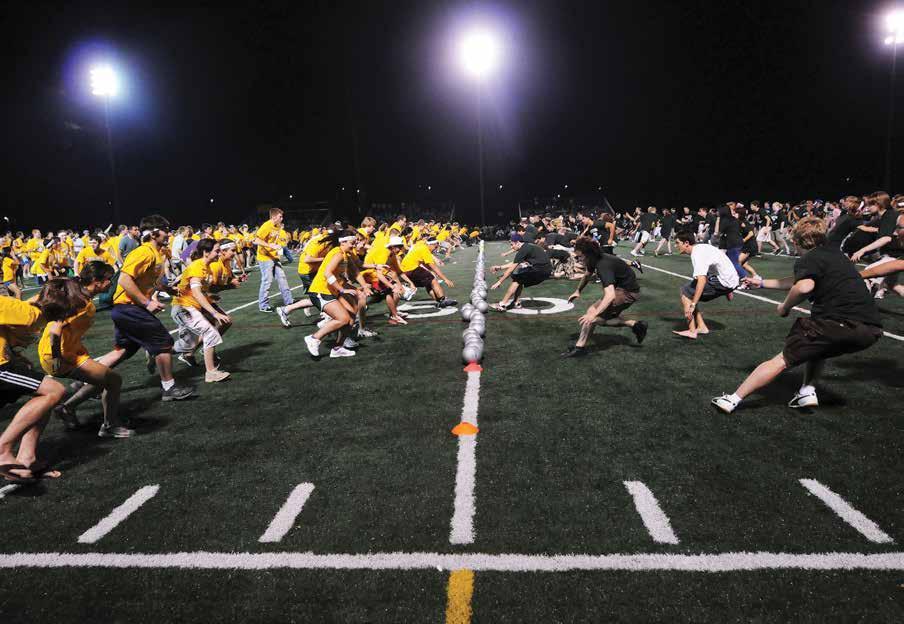
RETRO
PHOTO BY EVAN CANTWELL 56 |
MASON
SPIRIT.GMU.EDU



PACK LIKE A PATRIOT Find all you need for your upcoming travels and more at gmu.bncollege.com. #WEARMASON
4400 University Drive, MS 3B3 Fairfax, Virginia 22030
MASON FIRST—In May, the Mason softball team beat Loyola Chicago in extra innings in the final winner-take-all game to win its first Atlantic 10 Tournament in program history. The Patriots also competed in the NCAA Division I Softball Tournament for the first time.
Photo by Mason Athletics

A
@georgemasonu @georgemasonuniversity @georgemasonu @georgemason
gmu.edu #MasonNation
CONNECT WITH US


 Mason alum Sierra Guard, BFA '22, gazes at the night skies through Mason's world-class Ritchey-Chretien telescope at the Observatory on the Fairfax Campus.
Mason alum Sierra Guard, BFA '22, gazes at the night skies through Mason's world-class Ritchey-Chretien telescope at the Observatory on the Fairfax Campus.




 PHOTO BY RON AIRA
PHOTO BY RON AIRA











































 PHOTO BY EVAN CANTWELL
PHOTO BY EVAN CANTWELL








































